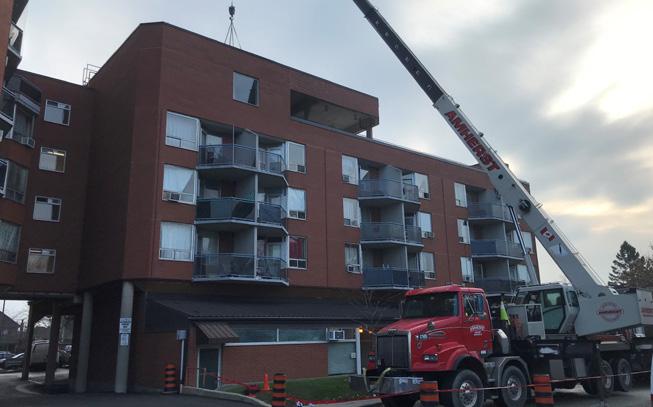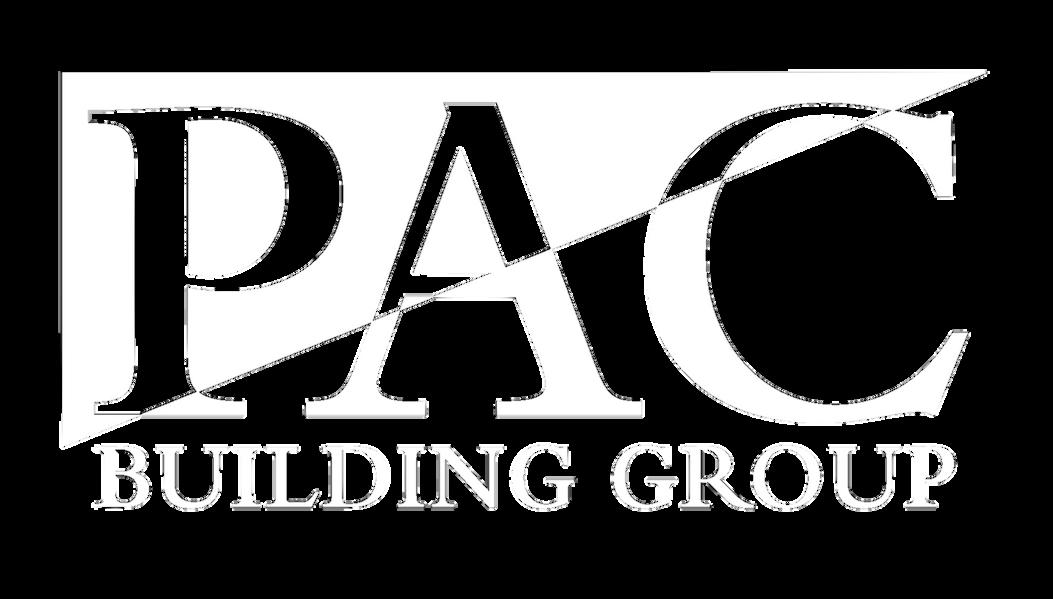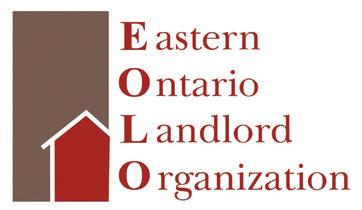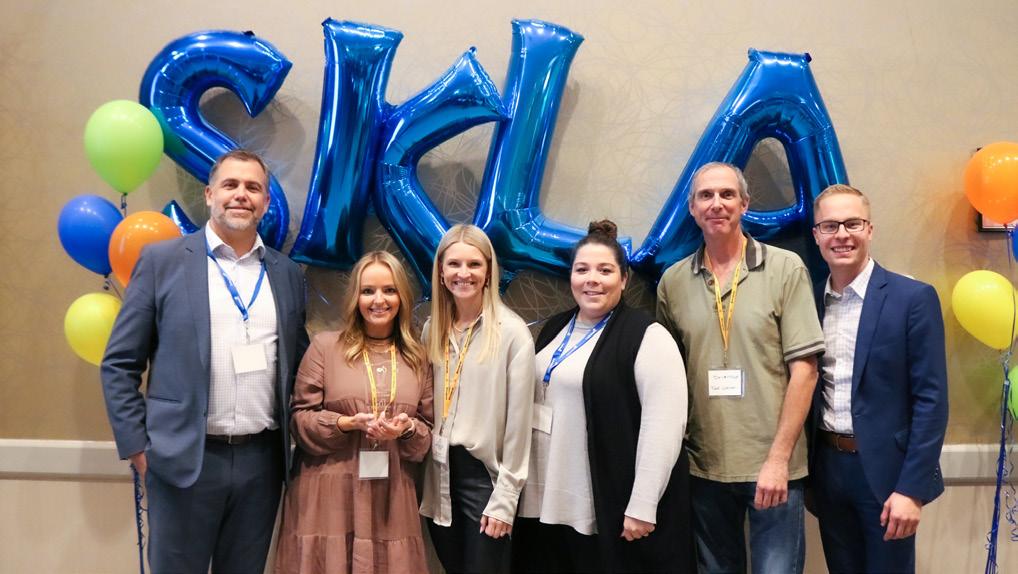The financialization of rental housing in Canada
The Federal Housing Advocate published a report that blames the private sector for most of Canada's affordable housing issues.
Data security in Canada
Learn why storing data in the cloud helps to protect it from cyber-criminals.

Yardi Canada National Multifamily Report
The report collects

The official publication of: Canada’s #1 most widely read publication for Apartment Owners, Managers and Association Executives Vol. 15 No. 4 November 2022 An Exclusive Interview with Hero Mohtadi of Dream by BoldTV anchor Kerry Chandler
rental
and CMA levels.
housing industry data at the national, provincial,
Master the of marketing art & science

SEO PPC REPUTATION MANAGEMENT SOCIAL MEDIA ANALYTICS WEBSITES
reach by rentcafe .com Reach renters everywhere with help from a full-service agency

Project Management | Building Science | Structural Engineering | Roofing Surveys | Condition Assessments | Asbestos and Mould Surveys 1.888.348.8991 McIntoshPerry.com We’ve encountered every possible building-related issue over our five decades of history. With more than 500 engineers, project managers and technical experts across the country, we provide a full range of services to the rental housing industry.
EDITOR’S NOTES
Everybody knows that Black Friday was on November 25, followed by Cyber Monday. Both these dates focus on commercialism and spending money, which have their positive and negative traits (e.g., buying things we don’t need, contributing to the economy). Not as much attention is paid to Giving Tuesday, which is a “global generosity movement unleashing the power of people and organizations to transform their communities and the world.” It promotes being generous, donating money, resources, and time to those in need, and thinking of ways to do good for others. The date has already passed, but we can all find time to give to others.
This month’s issue of RHB Magazine features an interview between Kerry Chandler, anchor and producer of BoldTV and RHBTV, and Hero Mohtadi, Vice President of Residential Operations and Asset Management of Dream Unlimited. Founded in 1994, Dream Unlimited is one of Canada’s leading real estate firms, with more than $17 billion in assets across North American and Europe. The interview took place at two of the company’s properties, including the Distillery District.
The second article examines the Federal Housing Advocate’s report on the financialization of housing in Canada. The report blames most of Canada’s housing issues (including high rents and lack of affordable housing) on the private sector’s investment in housing, and proposes a number of strategies to counter these effects. The third article discusses Yardi’s Canada National Multifamily Report, which provides current and relevant data and analysis on the rental housing market at the federal, provincial, and CMA level.
Check out CFAA’s newsletter, National Outlook, and the Regional Association Voice. FRPO and EOLO provide an update on the More Homes Built Faster Act . Yardi Canada wraps up this issue with a look at data security concerns in Canada.
If you have any comments or questions, send them to david@ rentalhousingbusiness.ca. I look forward to hearing from you.
David Gargaro Senior Editor

Publisher
Marc Côté marc@rentalhousingbusiness.ca
Associate Publisher Nishant Rai Editorial David Gargaro david@rentalhousingbusiness.ca
Contributing Editor
John Dickie, President CFAA jdickie@rentalhousingbusiness.ca
Kerry Chandler, Anchor - Producer RHBTV/BoldTV kerry@rhbtv.ca
Creative Director / Designer Scott Clark
Photography Noah Goldentuler Sales Executive Justin Kreslin
Office Manager
Geeta Lokhram
Subscriptions
One year $49.99 Cdn
Two years $79.99 Cdn Single copy sales $9.99 Cdn
Opinions expressed in articles are those of the authors and do not necessarily reflect the views and opinions of the CFAA Board or management. CFAA and RHB Inc. accept no liability for information contained herein. All rights reserved. Contents may not be reproduced without the written permission from the publisher.
P.O. Box 696, Maple, ON L6A 1S7 416-236-7473
Produced in Canada
All contents copyright © RHB Inc. Canadian Publications Mail Product Sales Agreement No. 42652516
Enjoy the issue!
4 | November 2022






We hope to partner with you today... ...to build for a SOLID tomorrow Emergency Response | Disaster Restoration | Suite Upgrades | Capital Improvements | New Development Montreal | Ottawa | Toronto | Edmonton | Calgary | Vancouver | Victoria 66 Leek Crescent, Richmond Hill, ON, L4B 1H1 info@solidgc.ca (905) 470-0707 solidgc.ca





6 | November 2022 47 Regional Association Voice RHB’s forum for rental housing associations to share news, events and industry information The Member Associations Hot Topics: LPMA discusses how the pandemic has taught employees that there's more to life than work, and how property management firms could be more efficient. pg. 49 HDAA discusses the results of the recent municipal election and the changes to the Board of Directors. pg. 53 EOLO discusses the election of a new mayor, and the impact of Bill 23 on housing development costs. pg. 57 SKLA discusses Conference 2022 and the association's advocacy efforts. pg. 61
Interview with Hero Mohtadi of Dream
BoldTV:
The financialization of rental housing in Canada The Federal Housing Advocate published a report that blames the private sector for most of Canada's affordable housing issues. Final Take Away Data security in Canada Learn how to protect your company's data from criminals. RAV features the latest industry news from four member associations. Yardi Canada National Multifamily Report The report collects rental housing industry data at the national, provincial, and CMA levels. CONTENTS VOL.15 NO.4 2022 64 30
Kerry Chandler, anchor and producer of BoldTV and RHBTV, interviews Hero Mohtadi of Dream Unlimited.

ASPHALT PAVING CONCRETE PAVING SITE servicing LANDSCAPE CONSTRUCTION BUILDING RESTORATION WINTER SNOW SERVICES service@forestgroup.ca 416.524.3000 24 HOUR EMERGENCY SERVICE forestgroup.ca DIVERSIFIED CONSTRUCTION
PRESIDENT’S CORNER
This issue of National Outlook provides information about the federal government’s steps to review housing issues, which could lead to counterproductive tax changes, or tighter rent control.
The National Housing Strategy Act was enacted under the Liberal government in 2019. It provided for the appointment of a Federal Housing Advocate, and the creation of a National Housing Council. The Advocate and Council members were duly appointed.
The Federal Housing Advocate seems to have taken her mandate to mean that she should amplify what ACORN and THE SHIFT say. Those are the two main advocacy groups which attacked the rental housing industry in the spring and summer of 2021, and persuaded the NDP to adopt various promises, which were in turn taken up in the Liberal Party platform. Find out more, starting on page 14 and on page 35.
The National Housing Council is not as biased as the Federal Housings Advocate, but it has initiated a consultation about the “right to adequate housing” (R2AH), which may be used to advance the advocates’ argument that the financialization of housing is a key problem. Find out the details, and what rental housing providers say about the issues, starting on page 38.
National Outlook also reports on in-place rents and rent increases for a large sample of rental units within the purpose-built rental sector, thanks to Yardi Systems. This data will serve as a useful corrective to the unhelpful narrative about significant rent increases in asking rents on turnover. See page 40.
CFAA-Rental Housing Conference 2023 will be held in Halifax from Wednesday, June 14 to Friday, June 16, 2023! Please plan to attend.
The Home Depot remains a CFAA Strategic Partner. By registering your membership in CFAA (either directly or through one of CFAA’s 13 member associations) with Home
Depot Pro, you benefit yourself and CFAA. This partnership benefits every rental housing provider reading this magazine.
Yardi Systems is also a long-standing CFAA Strategic Partner. As well as receiving Yardi’s help with rent information, we look forward to working with Yardi to bring you informative panels, and the latest and best information on technology and marketing for rental housing providers, at CFAA-RHC 2023 in Halifax.
If you are not already a direct member of CFAA, please consider joining CFAA as a Direct Rental Housing Provider Member, or a Suppliers Council Member. Visit www. cfaa-fcapi.org or e-mail admin@cfaa-fcapi.org today.
John Dickie, CFAA President

8 | November 2022

In this issue of... NATIONAL OUTLOOK
35. What are Minister Hussen’s appointees saying and doing about the causes of the current housing crisis? Have serious consultations to get to the root of the crisis began? What consultations have taken place? What does CFAA say should be done?


CFAA Member Associations
Corporation des Propriétaires Immobiliers du Québec (CORPIQ) www.corpiq.com P: 514-748-1921
Eastern Ontario Landlord Organization (EOLO) www.eolo.ca P: 613-235-9792
Federation of Rental-housing Providers of Ontario (FRPO) www.frpo.org P: 416-385-1100, 1-877-688-1960
Greater Toronto Apartment Association (GTAA) www.gtaaonline.com P: 416-385-3435
38. What issues have been brought to the National Housing Council about the right to housing? Is financialization one of them? What do rental housing providers say about the right to adequate housing, and what is needed to solve the current housing crisis?
Hamilton & District Apartment Association (HDAA) www.hamiltonapartmentassociation.ca P: 905-632-4435
Investment Property Owners Association of Nova Scotia (IPOANS) www.ipoans.ns.ca P: 902-425-3572
LandlordBC www.landlordbc.ca P: 1-604-733-9440

Vancouver Office P: 604-733-9440 Victoria Office P: 250-382-6324
41. Across Canada, the average in-place rent increased 4.3 per cent from one year ago, while inflation was 6.9 per cent. How much did rents increase in your city?
London Property Management Association (LPMA) www.lpma.ca P: 519-672-6999
New Brunswick Apartment Owners Association (NBAOA) www.nbaoa.ca jbrealsetate@nb.aibn.com
Manufactured Home Park Owners Alliance of British Columbia (MHPOA) www.mhpo.com P: 1-877-222-4560
To subscribe to CFAA’s e-Newsletter, please send your email address to communication@cfaa-fcapi.org.
The Canadian Federation of Apartment Associations represents the owners and managers of close to one million residential rental suites in Canada, through 12 apartment associations and direct landlord memberships across Canada.
CFAA is the sole national organization representing the interests of Canada’s $950 billion rental housing industry.
For more information about CFAA itself, see www.cfaa-fcapi.org or telephone 613-235-0101.
Professional Property Managers’ Association (of Manitoba) (PPMA) www.ppmamanitoba.com P: 204-957-1224
Saskatchewan Landlord Association Inc. (SKLA) www.skla.ca P: 306-653-7149
Waterloo Regional Apartment Management Association (WRAMA) www.wrama.com P: 519-748-0703
10 | November 2022
Ahmed Hussen, Minister of Housing and Diversity and Inclusion
Tim Richter, Co-Chair, National Housing Council









Fast Tenant Screening Online Rent Collection Accounting & Reporting Lead Management Lease with e-Signature Automated LTB Forms Maintainance Tracking Property Inspection Mi Property Portal Built per Canadian regulations For Canadian property managers & landlords www.mipropertyportal.com

REITs with the most owned units in Canada 2 1 4 3 5 CAPREIT - 68,100 Skyline Apartment REIT - 21,647 Boardwalk REIT - 33,629 Hazelview Investments - 23,513 Killam Apartment REIT - 24,557 Centurion Asset Management - 17,704 6



BoldTV: Interview with Hero Mohtadi of Dream
By David Gargaro
Kerry Chandler, anchor and producer of RHBTV and BoldTV, recently interviewed Hero Mohtadi, Vice President of Residential Operations and Asset Management of Dream Unlimited. This article includes an edited transcript of that interview. Use your smartphone or mobile device to scan the QR code below to watch a video of the interview on BoldTV. About Hero Mohtadi and Dream Unlimited
Hero Mohtadi has been involved in the real estate industry for more than 20 years, which includes a long and proven track record of successful management in the multi-residential asset class. She has worked in the institutional, private, and public sectors, and has been responsible for operations, strategic planning, development, leasing, and marketing. She joined Dream Unlimited in April of this year, bringing the ability to establish influential partnerships and effective leadership skills.
Founded in 1994, Dream Unlimited is one of Canada’s leading real estate firms, with more than $17 billion in assets across North America and Europe. The company develops multi-unit residential, commercial, retail, and industrial properties, and serves as an institutional asset manager for private clients.


14 | November 2022

BoldTV Interview
Kerry: Now, let me introduce my guest, Hero Mohtadi, vice president, residential operations and asset management, Dream. Welcome, Hero.
Hero: Hi, Kerry. Thank you. Nice to be here.
Kerry: So lovely to be with you. And before we start our interview, I would love to take a walk around this beautiful place.
Hero: Yes, absolutely, love to take you around. [Note: The video skips their walk around the Distillery District.]
Kerry: Once again, welcome Hero, and thank you for the tour. This is truly an iconic destination and to be here at festival time, wow! Let’s get started. Hero, please share with us a brief bio for Dream.
Hero: Over the last 25 plus years, Dream has successfully delivered over 10,000 homes and built over $17 billion of assets. Dream has also built a reputation for successfully developing large-scale, mixed-use, award-winning communities across Canada.
Kerry: That’s fantastic. You said over 25 years. I think a lot of our audience would be surprised to know that. Could you give us a little more history or background?
Hero: Yes, absolutely. So founded in 1994, Dream has a very heavy focus on building multi-use mixed properties across all of our platforms in Canada. Dream is a vertically integrated, fullservice company that focuses on developing, building, and managing all of our assets across all of our portfolios. Dream works with many exceptional partners, building communities that have positive impacts on community and the environment, alongside strong financial returns. Dream always invests with purpose, embracing creativity, passion, and innovation, delivering strong returns, while positively impacting the communities and the world around us.
Kerry: When and why did you get into multiresidential, and how do you plan to build it out?
Hero: In 2018, Dream and its partners were awarded to build out 2000 multiple purpose-built rentals in West Donlands and Canary Landing that gave a very strong foundation in focusing on building out the multifamily asset class. And with that, and of course, strong strategic acquisition, along with our heavy pipeline of development, we will build out the multifamily department.

Kerry: Well, let’s get to know you a little better,
Hero. How did you get involved in the rental housing industry?
Hero: So, I actually fell into property management. I started my career out as a leasing consultant with an organization named Charles E. Smith Residential in Arlington, Virginia. I was there for three years, when CES merged with Archstone Communities. I worked in various leasing roles in Arlington and Washington, DC, leading up to my move to Canada in 2004.
Kerry: I guess you worked your way up through various companies. What led you to join Dream specifically? What did you see in the company that made you want to make the move?
Hero: Dream has given me a fantastic opportunity to be part of our Canadian multifamily division. Being there at the initial stages of building out that platform, I am obviously very excited with the opportunity to be part of the initial stages. Furthermore, Dream’s vision and impact of improving residents’ lives in where they live is something that very much aligns with my own vision and goals of making those changes in the immediate communities that we work in but also the extended communities.
16 | November 2022 continued on page 22

Delivered to you by

On set in the Distillery District with Kerry
 By David Gargaro
By David Gargaro
From the beautiful and historic Distillery District, I’m Kerry Chandler and welcome to this special media event. Today I will be interviewing Hero Mohtadi of Dream Unlimited, an interview that will be simultaneously released as a cover feature in RHB Magazine, a digital version on RentalHousingBusiness. ca, and this video on BoldTV. Before I bring in Hero, let me first tell you about this incredible location. Dream has a long-standing history of transforming communities, developing some of Canada’s most iconic neighborhoods, including here, the Distillery Historic District, which transformed a derelict Victorian-era industrial complex into a world-class arts and culture, pedestrian-centred destination while maintaining its historic character plus the award-winning Pan Am Athletes Village in the Canary District. These communities, as well as Brighton in Saskatoon and Zibi in Ottawa, one of Canada’s most sustainable communities, are all examples of large mixed-use communities that demonstrate the expertise and commitment of Dream’s impact pillars.




18 | November 2022


CONTACT US! info@snaile.com or visit www.snailelockers.com for contactless and secure resident delivery information MULTI-RESIDENTIAL | RETAIL | OFFICE | SCHOOL CAMPUS | www.snailelockers.com MANAGING RESIDENT DELIVERIES WHY SNAILE CANADA? Scan QR Code to find out! CERTIFIED DATAHOSTED INCANADA SERVICING NAC A D AN DATA SECURITY PRIVACYLAWS PROC E D SERU C ANADIANCARRIERSDELIVE R CONTRACTS INFORCE PROTECTED BY PIPEDALAW S CANADIAN TOWNS+CITIES55 + OEM $ 9/10 SERVICING LARGEST CANADIAN BUILDING OWNERS CANADIAN CYBER INSURANCE POLICY MADE IN CANADA INTEGRATED WITHYOURBUILDING SSOFTWAR E API ISO/IEC 27001 PRICE MATCH GUARANTEED PROTECTED BY CANADIAN ELECTRICAL CODE CSA C22. 1 FIRE RATED CAN/ULCS102 ORIGINAL EQUIPMENT MANUFACTURER NOT A RESELLER ICKETIN UP TO 355x LESS ² CO EROM VNE I R ONMENTALLY FRIENDLY
Kerry: Now, I want to go back to something I had mentioned in my opening, but first with some sadness we have to leave this incredible location. However, through the magic of video we’re going to be transported to another award-winning building in the Dream portfolio. So, hang on tight; this may or may not hurt.
[Note: The video skips to the new location.]
Kerry: Well, that transition didn’t hurt you but it hurt us being out in the cold for so long. Now we’re quite cozy, safe and sound, nestled in the brand-new Weston Common development and winner of the 2017 BILD Award for Best New Planned Community, West22. Hero, let’s give our audience a quick tour.

Hero: Absolutely, let’s go.
[Note: The video skips their walk around the Weston Community development.]
Kerry: What an amazing complex. How would you describe this facility?
Hero: West22 is a resort-style experience with very thoughtful suite design. Everything is available here. I would point out some of the spectacular views of our city. This purpose-built rental building has everything you want, right on site.
Kerry: Congratulations, absolutely beautiful. Now, before I went all “I Dream of Jeannie” on us at the Distillery District, as mentioned, I want to
go back to something I touched on in my opening about Dream and how they plan to grow. Hero, how does the company’s pillars philosophy tie into building, owning, and managing multi-residential properties?

Hero: Creating positive impact forms an integral part of who Dream is, how Dream invests, and how Dream has done business for more than 25 years. It is integral to Dream’s purpose to build better communities and aligns with Dream’s impact pillars: environmental sustainability and resilience, attainable and affordable housing, and inclusive communities.
Kerry: How do you feel this differentiates Dream from other companies in the industry?
Hero: Our focus on impact and our pillars really differentiates Dream from other real estate companies. For example, at some of our multiresidential properties or developments, we may offer programming and services to the residents to foster a sense of community and inclusivity. Dream also has a long-standing history of transforming communities, having developed some of Canada’s most iconic neighbourhoods, including the Distillery Historic District, which transformed a derelict Victorian-era industrial complex into a world-class arts and culture pedestrian-centred destination while maintaining its historic character, and the award-winning Pan Am Athletes Village in the Canary District. These communities, as well as Brighton in Saskatoon and Zibi of course, one of Canada’s most
20 | November 2022 continued from page 16



Capital Upgrades Leasehold improvements In suite Renovations Capital Upgrades & Design Millwork Facilty CNC operated Custom Kitchens Office Furniture Metal Works (Custom Radiator Covers Steels and Stainless steel) SCG Electrical SCG Metal Works SCG Plumbing SPECIALIZED IN +1 (905) 820-5500 www.skycontractinginc.com SKY IS THE LIMIT Apartment Turnover Capital Upgrades Fire & Flood Restorations 24/7 Emergency Fire & Flood Restoration OVER 15 YEARS OF EXPERIENCE
sustainable communities, are all examples of large mixed-use communities that demonstrate our expertise and commitment to our impact pillars. Whatever Dream does, Dream works to create value and leave everything better than it was before.





Kerry: That’s interesting. Bringing this back to you, how and what do you believe you add to Dream’s management team?

Hero: Well Kerry, I add value through 20+ years of experience, industry knowledge, leadership, and, more importantly, passion and commitment for what I do as I love what I do, which shines through every day. Furthermore, I bring love and passion to an ever-changing landscape within property operations and people management. Our people are the biggest asset in our industry and being able to be at the forefront of fostering and building that team within Dream is a great opportunity and challenge.
Kerry: I can see that you are a caring and compassionate person. They’re lucky to have you. Now, I want to get a little more personal. You’ve volunteered on several boards and committees for different organizations. Why is this so important to you?
Hero: I firmly believe that one has to give back in the communities where we work and live. I have a lot of committees and a lot of causes that I feel very passionate about and that are very
close to my heart. In addition to that, being a first-generation Kurdish-Canadian, I’ve always believed in giving back to my own community but also creating a lot of opportunities for people in the immediate and also extended community for people who probably would not have had those opportunities along the way. Giving back to the community where I live and where I work is very close to my heart.
Kerry: As we wrap things up, I’m going to get a little philosophical. Hero, if you were to mentor a young woman entering the industry, what advice would you give her?
Hero: I would say to bring your A game, bring your passion for learning, keep an open mind to challenges, and have fun along the way. It is important to take those opportunities that come your way. But like I said, you need to have fun along the way. Enjoy your job and enjoy the ride. With that comes growth along the way, and when it does, make sure you bring others with you.
Kerry: Wonderful. Hero Mohtadi, Dream, thank you so much for being part of this special video broadcast and magazine feature plus showing us two absolutely beautiful and amazing locations. All the best. I hope to see you again soon.
Hero: Thank you so much Kerry for having me. I enjoyed our conversation.
Kerry: Me as well. And that is all for our special episode on BoldTV.
22 | November 2022
o n t r a c t i n g
C O
M M O N -












A M
N
A R
E A S b u i l d i n g e n v e l o p e
W e f o l l o w s t r i c t s a f e t y p r e c a u t i o n s w i t h a f o c u s o n s a n i t i z a t i o n , p e r s o n a l p r o t e c t i v e e q u i p m e n t a n d p h y s i c a l d i s t a n c i n g .
P A C B u i l d i n g G r o u p i s a f u l l s e r v i c e G e n e r a l C o n t r a c t i n g f i r m s e r v i c i n g S o u t h e r n O n t a r i o , M o n t r e a l a n d O t t a w a r e g i o n s . W e d e l i v e r c o m p r e h e n s i v e b u i l d i n g s o l u t i o n s f o r a l l p r o j e c t t y p e s . W e p a r t n e r w i t h o u r c l i e n t s t o u n d e r s t a n d t h e i r g o a l s a n d i n t e r p r e t t h e i r v i s i o n , b u i l d i n g s p a c e s t h a t a r e d i s t i n c t l y s u i t e d f o r e a c h e n v i r o n m e n t . W i t h a n i n t e g r a t e d a p p r o a c h a n d s e a m l e s s p r o c e s s , w e o u t p a c e t r a d i t i o n a l e x p e c t a t i o n s .
I N F O @ P A C B u i l d i n g g r o u p . c o m | 9 0 5 - 6 0 5 - 4 7 2 2 7 5 0 0 M A R T I N G R O V E R O A D U N I T 6 , V A U G H A N , O N L 4 L 8 S 9 M U
-
L C
L T I
R E S I D E N T I A
E
I T Y S P A C E S s u i t e r e n o v a t i o n s
C O V I D - 1 9 S A F E T Y A W A R E N E S S
financialization
The financialization of rental housing in Canada
By David Gargaro
In June 2022, Canada’s Federal Housing Advocate released a report entitled “The Financialization of Housing in Canada: A Summary Report for the Office of the Federal Housing Advocate.” This document includes a series of reports and recommendations on the causes of, and potential solutions to, Canada’s affordable housing crisis. As indicated by its title, the report places the majority of the blame on the financialization of housing, wherein the private sector’s investment in housing has made it more difficult and expensive for people to own and rent homes.
The reports focus on corporations and investors that “profit from rent increases,” including “allowable rent increases between tenancies.” Implementing a different approach would make it incredibly challenging for private investors to own and manage rental property. Given that 89 per cent of Canada’s rental stock is privately owned, this would mean putting most of the rental housing sector under government oversight or ownership or funding it through tax dollars. This would be disastrous for rental property owners, tenants, and taxpayers as it would greatly discourage the addition of new rental housing supply, as well as hinder the repair and upkeep of existing rental stock. However, the summary report goes even further in its recommendations, which include:
• Setting regulations on banks to prevent them from lending to profit-making rental firms
• Prohibiting pension funds from investing in profit-making firms
• Preventing profit-making firms from accessing federal mortgage insurance and other government programs
• Capping the number of rental units that profit-making firms can own or purchase
• Expropriating “affordable” housing units currently owned by profit-making firms
• Imposing Canada-wide rent controls
• Removing the tax status and incentives for
real estate investment trusts (REITs)
• Abolishing federal policies that provide a privilege to home ownership over renting
• Implementing measures to prevent the displacement of tenants
What is financialization?
According to the report, financialization is the “process in which finance capital has come to dominate the economy and everyday life, and in which money is increasingly made through financial channels, rather than by making things.” The report associates financialization with social inequality and putting shareholder value and financial metrics ahead of social, environmental, cultural and other goals.
The financialization of housing means that homes are increasingly being purchased by firms and investors for the primary purpose of making a profit rather than providing a place to live. Financial entities (e.g., private equity firms, REITs, asset managers) are purchasing homes and securitizing mortgages to create investment products. Their goal is to maximize profits through various strategies, such as renovating properties to reposition them for higher rents, and reducing staff and maintenance expenses.
The financialization of multi-family rental housing is similar, in that financial firms purchase rental properties to turn them into investment products and maximize profits for their investors, shareholders and executives.

24 | November 2022

According to the report, financialized firms own about 20 per cent of Canada’s purpose-built rental housing stock. During the pandemic, the report says more rental housing stock was consolidated, and this has led to “rising rent levels, displacement pressure, impacts on tenant quality of life, higher rates of eviction, and gentrification.”
In a nutshell, the Federal Housing Advocate has taken the position that corporations are purchasing the majority of rental properties, enabling them to increase rents, which is pushing out low-income tenants and harming vulnerable populations. To protect these groups, the Federal Housing Advocate wants to ban (or at least severely limit) what private market firms can do.
National Housing Strategy
In 2017, the federal Liberal government announced the National Housing Strategy, a 10-year, $37 billion initiative to address housing affordability. One of its goals was to increase the stock of new houses, condominiums, and apartments to meet the growing demand for affordable housing. However, provincial and municipal government regulations and restrictions have made it difficult to build housing at sufficient scale to meet the increasing demand.
Even though housing prices have declined recently (primarily due to rising interest rates), the rental market has not benefited because increases in rents have been constrained and the growth in immigration continues to push up demand for rental homes. Since 2019, the federal government has increased its funding for the National Housing Strategy to more than $70 billion, focusing on obtaining moderately affordable rental units through the RCFI program, and more funding notfor-profit, community, and co-op housing projects.
In 2019, the federal government followed up its National Housing Strategy with the National Housing Strategy Act (NHSA). The legislation set up the Federal Housing Advocate, whose role is to amplify the voices of vulnerable populations, and the National Housing Council, which informs the federal Housing Minister on human rights-related housing matters. In addition to supporting the National Housing Strategy, the NHSA states that the federal government “recognize[s] that the right to adequate housing is a fundamental human right.” The act lays out the minimum criteria required to meet the right to adequate housing, which includes:
• Security of tenure
• Affordability
• Accessibility
• Proximity to opportunities and services that is also free from danger
• Cultural adequacy
• Availability of services and infrastructure
This is a significant change in how housing is viewed and treated in Canada. Housing has always been a commodity that buyers and sellers freely negotiate in an open market. Many factors (e.g., supply and demand, interest rates, unemployment rates) influence the value of each housing unit.
However, through the NHSA, Parliament has stated that housing is a human right and a moral imperative, and it’s not just or appropriate for firms to make transactions about rental housing based on free market principles. According to Federal Housing Advocate, Marie-Josée Houle, financialization “is not only contributing to unaffordability across the country – it is also denying people their fundamental human right to affordable, dignified, and safe housing.”
Under the NHSA, the Federal Housing Advocate may use the right to housing to advocate for what rental property owners should and should not do. This could include preventing rental property owners from increasing rents to keep up with inflation (or at all), evicting tenants for non-payment of rent or other reasons, or managing their properties for profit.
The Charter of Rights of Freedoms does not explicitly protect property rights. At the same time, the Charter does not provide a right to housing; rather it protects Canadian citizens from certain arbitrary actions by governments. The rights people have not to be discriminated against come to us under the provincial human rights laws or “human rights codes.” For housing to be made a human right would require provincial legislation. Of course, that legislation could be adopted by the provinces at the request of the federal government.
Countering the summary report’s findings
The summary report states that the financialization of housing:
• Increases the costs of housing for homeowners and renters
• Reduces the quality of life for tenants
• Raises the likelihood of displacement and eviction
26 | November 2022

As an industry leader in utility submetering, billing and expense management, Wyse proudly serves the Canadian market coast to coast with over 220,000 suites under contract. We look forward to creating a brighter future through the latest innovation in sustainable, energy-efficient solutions. A Smarter Future Starts Today. wysemeter.com Register now at • Submetering • ESG Reporting • EV Charging • In-Suite HVAC • Leak Detection • Expert Billing
• Negatively impacts residents’ mental and physical health
• Disproportionately affects marginalized groups
Financialized firms are not driving Canada’s rental housing industry. According to Statistics Canada, almost one in five homeowners own more than one property. Rental property owners range from individuals who own one rental property to large corporate entities with thousands of units. Unlike telecommunications, banking, and other industries, the rental housing industry is not top-heavy – the five largest private rental housing firms own less than 5 per cent of privately held rental housing units.
The summary report focuses on the harms allegedly caused by large corporate entities in the financialization of housing. However, it does not provide evidence that large firms are more likely to raise rents than any other type of rental property owner. Every person or entity that owns rental properties wants to earn a living from their business. As utilities and other costs rise due to inflation, so do rents, as rental property owners must cover their expenses.
According to Statistics Canada’s Canadian Housing Survey, rental conditions have not worsened with the increase in corporate ownership. Its key measures of housing affordability show that there has been substantial improvement for people on the lower end of the income scale. The share of households in “core housing need” (i.e., accommodations fall below acceptable standards for size, condition, or cost) has fallen from 12.7 per cent to 10.1 per cent, a decline of 20 per cent since 2016.
As for the financialization of housing reducing tenants’ quality of life, this is far from the case in most situations. REITs and large firms that own rental properties are more capable of running their operations in a professional manner. They have the resources to maintain their rental properties to tenants’ benefit, as well as set up procedures that make rental housing more efficient for all parties. Tenants in privately owned rental properties tend to have access to more amenities, and live in better maintained properties and units, than tenants living in public housing.
Displacements and evictions make the news, but they are not the norm for REITs or large firms that own rental properties. Every building will require renovations at some point, as the majority of Canada’s rental stock is more than 40 years old. Many tenants
prefer to live in new or newly improved buildings. Major renovations necessitate increasing rents to pay for repairs and upgrades. Rental property owners also want to keep responsible tenants who pay their rent, as it takes time and resources to bring in new tenants.
Many large rental property firms have stepped in to help their tenants who have physical and mental health issues, especially during the pandemic. This includes providing amenities and programs that benefit tenants’ physical and mental health (e.g., yoga, childcare, social events). There are numerous examples of corporations instituting programs to help tenants who are physically challenged (e.g., making the building and individual units more accessible, supporting food and package delivery, providing transportation). Many rental property firms have partnered with social services agencies to help support tenants with mental and social challenges. Marginalized groups, such as “members of Black communities, recent immigrants and refugees,” have not been disadvantaged by the financialization of rental housing. Many rental properties are multicultural, and they may be the most affordable housing options for marginalized groups. Firms in the rental housing industry use computerized systems to approve new tenants, which essentially eliminates racial discrimination and bias. The summary report also states that Toronto Community Housing, which is home to many marginalized groups, is just as likely to evict tenants for non-payment of rent as private rental property firms.
Conclusion
The Federal Housing Advocate’s report declares that “the right to housing is a social right recognized in international law.” It also states that the financialization of housing is responsible for the affordable housing crisis, the increasing cost of home ownership and rents, reduced quality of life, and other issues. However, the financialization of rental properties and for-profit rental property owners are not to blame for Canada’s housing crisis. The solution to the housing crisis is more housing supply. Private market rental property owners are best positioned and able to build the additional housing Canadians need. To address Canada’s housing crisis, private market rental housing providers need to be encouraged to be a part of the solution, rather than being accused to be the cause of the problem.
28 | November 2022
PROVIDING OUR CLIENTS WITH THE HIGHEST POSSIBLE ROI


THE APT PROMISE:

. .
Yardi Canada National Multifamily Report
By Kerry Chandler, RHBTV Anchor/Producer
Recently, I interviewed Peter Altobelli, vice president and general manager of Yardi Canada, on the importance of having accurate and reliable industry data, such as vacancy rates, average rents, rent growth, and so on. Rental property owners, managers, investors, and others are unable to make informed decisions on their properties because rental housing industry data is usually limited or out of date.
In February 2022, Yardi sought to address this issue by launching the quarterly Canada National Multifamily Report, which collects and analyzes industry data and fundamentals at the national, provincial, and Census Metropolitan Area (CMA) levels. Yardi designed the report to help businesses measure portfolio performance, optimize property management, and identify investment opportunities.
Creating the report
Yardi’s Canada National Multifamily Report is unique as it goes beyond market rent data and survey results. It provides information on in-place rents, which refers to monthly rent per unit for all leases, including new lease rents, renewal lease rents, and existing leases. It also reveals stats and analysis on lease-over-lease-growth (i.e., changes in monthly rent between a new lease and the previous lease for the same unit) and vacancy and quarterly turnover percentages, which are not typically shared in the industry.
“The Canadian Multifamily National Report presents a new dynamic resource for the real estate industry,” said Peter Altobelli, Vice President and General Manager, Yardi Canada Ltd. “We are sharing this information with the public after numerous requests from government bodies, associations, and clients that were looking to understand how the pandemic impacted the rental market. Data on Canadian rental trends is relatively sparse. This report is intended to provide insights that influence well-informed investment decisions and innovation within the multifamily sector.”
To compile the report, Yardi aggregates and anonymizes data from its clients, who collectively own more than 350,000 units across Canada. This
data is also inclusive to publicly available sources of industry data. As Yardi continues to grow its market share in this industry, its data sources are further expanded. Providing this level of current information enables rental housing professionals to make data-driven decisions.

Using the data: CMA vacancy rates
The data and graphs within this report highlights CMA vacancy rates (see Figure 1). According to the findings, the national vacancy rate fell to 2.9 per cent in Q3 2022, which is a 20-basis-point (bp) decline from Q2 and a 110-bp decline yearover-year. Montreal has the highest vacancy rate (6.0 per cent) by far of all CMAs, followed by Edmonton at 4.1 per cent. Halifax and Vancouver have the lowest vacancy rates at 1.4 per cent and 1.3 per cent, respectively.
“Experienced rental housing professionals are able to utilize our data to benchmark their properties against the industry,” said Altobelli. “Brokers, owners, banks, and REITs are downloading the reports quarterly and leveraging it to their respective needs. For those who are new to the industry, using this data will help you to better understand the ever-changing market.”
30 | November 2022
The report also analyzes some contributing factors for changes in vacancy rates. For example, despite ongoing net out-migration to smaller CMAs, Toronto’s vacancy rate dropped 80 bps in Q3, which can be attributed to Toronto’s population inflow being largely driven by immigration. On the other hand, Halifax has seen pandemic-related migration from urban centres, driven in part due to the Nova Scotia provincial government’s advertising campaign designed to lure residents from other provinces.

Figure 1: CMA Vacancy Rates, Q3 2022
Conclusion
Having access to current rental housing industry data enables rental property owners, managers, and investors to make more informed decisions. With Yardi’s Canada National Multifamily Report, real estate professionals can uncover actionable business insights that help monitor operations and increase revenues. I will be discussing this report in greater detail on an upcoming RHBTV segment with Peter, with the interview being made available in early December.
rentalhousingbusiness.ca | 31
0% 1% 2% 3% 4% 5% 6% Montreal Edmonton National Winnipeg London Ottawa–Gatineau Hamilton Toronto Calgary Kitchener–Cambridge–Waterloo Halifax Vancouver CMA Vacancy Rates (Q3
Exclusive Discounts for the Rental Housing Industry Members and supplier members of apartment associations save more on home and auto insurance with Westland MyGroup. Click or call for a quote today: westlandmygroup.ca/CFAA 1-844-999-7687
Source: Yardi.com/CNDMultifamilyReport
2022)



Luxer One has 15+ years of experience providing industry leading Parcel Locker solutions. Coinamatic is a proud Canadian Distributor of Luxer One parcel delivery lockers. www.coinamatic.com | 1.877.755.5302 | info@coinamatic.com CONTACT US! MADE IN NORTH AMERICA USER FRIENDLY APPLE IPAD TOUCHSCREEN UL CERTIFIED 12-GAUGE STEEL The Future of Package Management! User Friendly Self Service 24/7 Package Access Eliminates constant staff disruption for deliveries Officially approved by Canadian Carriers Robust Lockers designed and built in USA 6-8 week delivery timeline Over 200,000,000 parcels delivered to Luxer One lockers





Learn more about our mobile and cashless bundles and other digital laundry room solutions. Future-proof your laundry. Keep your residents happy with Coinamatic’s digital laundry room solutions. With the Coinamatic digital laundry room mobile app + card bundle, residents get their choice of easy-to-use mobile or laundry card payment. Mobile App + Laundry Card Bundle


News as
air legal analyst. Kristin will be answering questions from YOU our viewers. Send your questions to info@rhbtv.ca and Kristin will answer them on upcoming shows
Kristin
Ley, Partner, Cohen Highley, has joined RHBTV
an on
Federal tax & rental housing issues – the latest developments
By John Dickie, CFAA President
As reported in the August/September issue of National Outlook, Prime Minister Trudeau has directed the Finance Minister and the Minister of Housing to work together to deter “renovictions” and address housing affordability in Canada, including by:
• Introducing amendments to the Income Tax Act to require landlords to disclose in their tax filings the rent they receive pre- and postrenovation and to pay a proportional surtax if the increase in rent is excessive;
• Considering possible reforms to the tax treatment of Real Estate Investment Trusts,
• Reviewing the down payment requirements for investment properties, and
• Developing policies to curb excessive profits [in rental housing]
There is to be a consultation on those issues and remedies. However, since September, the government as a whole does not appear to have advanced its consultation plans much. On the other hand, two major moves were made by housing actors appointed by the Minister of Housing.
Reports by the Federal Housing Advocate
The National Housing Strategy Act was enacted under the Liberal government in 2019. Under that Act, the role of the Federal Housing Advocate is to act as an independent, non-partisan watchdog, monitoring the implementation of housing policy, assessing its impacts on vulnerable groups, and reviewing systemic housing issues. (Non-partisan means not driven by party politics, rather than even-handedness between renters and rental housing providers.)
In practice, the Advocate seems to have taken her mandate to mean amplifying what ACORN and THE SHIFT say. Those are the two main advocacy groups which attacked the rental housing industry in the spring and summer of 2021, and persuaded the NDP to adopt the promises listed above, which were in turn taken up in the Liberal Party platform.
Over recent years, ACORN had surveyed its members about their (dis) satisfaction with their landlords. Since ACORN’s members join ACORN due to dissatisfaction with the results of the current market-based housing and income distribution systems, the survey results were predictable.
Recently, the Federal Housing Advocate reformatted ACORN’s reports of the surveys and republished them, thus giving them an aura of credibility. In addition, some of the ACORN reports leap from “here are problems”, to the cause of the problems is “financialization”, which is a fancy new word for the profit motive. The recommendations seek to take private sector financing, and profit making, out of rental housing.
Any knowledge of economics, business sense, or common sense, would indicate that driving capital investment, and the profit motive, out of rental housing is a recipe for less new rental supply, and less capital investment in upkeep and upgrades for existing rental buildings. Such
rentalhousingbusiness.ca | 35 NOVEMBER 2022
“Yardi Investment Manager has been a critical element of Baceline’s ability to grow our investor base and scale our investor relations department. The level of comprehensive, dynamic investment data brings confidence to our investors and credibility to our business.”

BACELINE INVESTMENTS

Learn with us at Yardi.com/ Webinars (888) 569-2734 | Yardi.com/IMsuite ©2022 Yardi Systems, Inc. All Rights Reserved. Yardi, the Yardi logo, and all Yardi product names are trademarks of Yardi Systems , Inc. Investments grow on Yardi • Provide a branded investor portal to publish property metrics and data • Automate the subscription agreement process for new investment opportunities • Track capital activity, investor commitments, contributions and distributions
Lindsey Reevie Partner
NATIONAL OUTLOOK
“reforms” would be worse than going back to the 1980s in Ontario when the only way to keep a rental building financially viable was to cut maintenance to the bone, and minimize building improvements.
If the main sources of capital for rental housing is government money, and “patient capital” (which accepts a low rate of return to serve investors’ social consciences), there will be much less capital invested in rental housing, and over time, there will be a much lower supply of rental housing. That outcome would mean increased housing shortages and increased rental housing costs for everyone, especially low-income people.
The Financial Post published a column quoting CFAA data, and invoking other arguments, to condemn the Federal Housing Advocate’s recommendations. The column can be found by going to “Federal Political Updates”, within “Resources” at www.cfaa-fcapi.org.
National Housing Council
The National Housing Council was also established by National Housing Strategy Act. Its role is to provide advice to the Minister of Housing to promote participation and inclusion in the development of housing policy with the aim of improving housing outcomes for everyone in Canada.
Fortunately, the National Housing Council has demonstrated less bias than the Federal Housing Advocate. A number of the Council’s members are leaders of non-profit housing providers. They know about the costs of maintaining and upgrading buildings, the cost of new construction, and the government mis-steps at all levels which gum up housing supply. They also know that evictions require a long process in which tenants, or co-op members, have substantial procedural rights, and often invoke them.
The National Housing Council has initiated a consultation about the “right to adequate housing”. That right underlies the objections to “renovictions” and “demovictions”. The more extreme housing advocates believe that all orders of government have the responsibility to tighten regulations on private sector housing actors to ensure the sector does not exclude people from their right to housing by terminating tenancies to demolish buildings to intensify the site they are located on, to renovate buildings, or even potentially because of non-payment of rent. See the article on page 38 for more on the consultation about the right to adequate housing.
Action being taken by CFAA and others
While CFAA continues to monitor and respond to government action, including continued engagement at executive political and departmental levels, little has been announced in the way of consultations other than the consultation by the National Housing Council on the right to adequate housing.
The “Big Five” public, multi-family REITs are CAPREIT, Boardwalk, Killam, InterRent and Minto. They are now very active in federal lobbying. Along with other major corporate rental providers, the REIT Group is also active in public relations/social media efforts. CFAA is meeting with them regularly to coordinate actions in both regards, and is in close contact with FRPO and REALPAC to coordinate the efforts of all four groups.
CFAA’s main submission to government is dated October 3, 2022, and called “Rental Housing Industry Facts”. It can be viewed on CFAA’s website under the “Resources” tab, on the “Federal Political Updates” page. The submission addresses:
• the lack of concentration in rental housing
• rental housing returns on investment
• tenant satisfaction and affordability

• evictions, both informal and formal
• the limited extent of evictions and “renovictions”
• investment in rental housing
• the need for more rental supply
rentalhousingbusiness.ca | 37
NOVEMBER 2022
CFAA also made a pre-budget submission for Budget 2023, dated October 7, 2022. It can also be viewed on CFAA’s website under the “Resources” tab, on the “Federal Political Updates” page.
Recommendations in CFAA’s 2023 Pre-Budget Submission
1. Avoid new taxes on REITs and real estate corporations, to avoid deterring investments in existing rental stock and new supply.
2. Avoid taxes on renovations since there are better ways to address the issues in that area, and the government cannot afford to deter investments in Canada’s rental supply.
3. Before taking any measures that could discourage new housing supply, conduct robust consultations that collect valid statistical evidence. That includes not adopting recommendations of the tenant and human rights advocates (and the Federal Housing Advocate) without a thorough consultation, including the use of valid, random surveys, and hearing from the rental housing industry and housing economists, to develop evidence-based policies.
4. Focus immigration on construction tradespeople and construction labour, to help increase housing supply to house the renewed influx of immigrants and non-permanent residents.
5. Build on the Canada Housing Benefit.
6. Cancel the announced changes to the Rental Construction Financing Initiative, OR replace RCFI with a new program focused exclusively on rental supply.
7. Advance the Housing Accelerator Fund with an emphasis on MARKET rental housing
8. Support Rent-to-own in the private market.
CFAA has used those two submissions in our government relations work with the Department of Finance, the Minister of Housing, CMHC, the Prime Minister’s Office and the Privy Council Office. The Prime Minister’s Office (or PMO) consists of the top level of political advisors to the Prime Minister and the government. The Privy Council Office (or PCO) is the top level of the public service, which co-ordinates advice and action across government departments and provides advice to the Prime Minister and the Cabinet.
Conclusion
From CFAA’s government relations work (and the work of REALPAC and the REIT Group), it appears that many officials are questioning the story being told by the tenant advocates, and are happy to hear a different view of the facts from CFAA and the rental housing industry, based on randomized, unbiased surveys and credible data, which CFAA has been able to provide due to our housing policy work over many years.
NHC Consultation on the Right to Housing
The National Housing Council was established by the National Housing Strategy Act to promote participation and inclusion in the development of housing policy and to provide advice to the Minister of Housing with the aim of improving housing outcomes in Canada.
The Council has initiated a consultation about the “right to adequate housing” (R2AH), seeking to find common ground among the views of contending parties in this area, including people with lived experience of homelessness or housing need, housing service agencies, the three orders of government, non-profit housing providers and private sector rental housing providers.
The Council defines R2AH as “the right to live somewhere in security, peace and dignity.” Private sector rental housing providers can work much better with a right to live in security, peace and dignity somewhere, rather than a right to live where a person happens to be living, at the rent they happen to be paying.
Key gaps seen by those surveyed
The Council began its work several months ago, and published an Interim Report, written by its consultants, based on the initial consultations with people with lived experience of
38 | November 2022
NATIONAL OUTLOOK
homelessness or housing need, and housing service agencies. Here are the eight key gaps seen by those respondents, grouped in three areas.
The Urgency of Today
There is an urgency to fix today’s problems. The severity and urgency of today’s gaps underscore a needed focus on addressing them—people’s lives are at stake today.
GAP 1: There is a limited supply of housing geared to those in greatest need
GAP 2: The lack of choice fuels stigma and discrimination … and often displacement from one’s community, culture or family.
GAP 3: There is a significant income and support service gap.
Preserving What We Have
While addressing today’s problems, we must also halt backward movement. There is a need to keep up with change to maintain housing for people who have it today.
GAP 4: For those who have housing, situations may be inadequate.
GAP 5: There are few effective mechanisms for claiming one’s right to housing.
Gap 6: Inaction against backward movement is increasing the precarity of tenure for many. Resilience for Tomorrow
GAP 7: Rigid rules and mindsets get in the way of change.
GAP 8: There is a sense of helplessness as housing situations worsen. Many of the proposed solutions are sensible, and CFAA and the rental housing sector endorse them. However, some of the proposed solutions are unrealistic and counter-productive.
Financialization of housing and rent control
Under GAP 6, the Interim Report raised the most worrisome note, saying “The ‘financialization of housing’ was cited as a top barrier to realizing the right to adequate housing by survey respondents and lived experts. … [A] primary goal of our current system is to generate wealth by maximizing returns for both household and institutional investors in housing. … This underlying function is seen as being fundamentally at odds with the goals of housing as a human right, and was identified as contributing to, or linked to, several other barriers that respondents experience, including rising house prices, reduced security of tenure, and decreased supply of affordable and below-market rental units.”
Suggested remedies to the effects of financialization include tighter rent control, and more security of tenure for renters, across Canada. Those comments and proposed “solutions” are particularly a matter of concern because imposing tighter rent control would drive investment away from rental housing, whereas more investment is need to address the supply issue, which is at the root of the problem.
Unless done with a very deft hand, more security of tenure would also interfere with more rental supply by slowing down or stopping intensification. What is needed is better access to alternate accommodation, rather than stronger rights for renters to remain exactly where they happen to live at a particular point in time. People need somewhere appropriate to live, but blocking intensification makes the housing shortage worse for everyone.
Views of the private sector
As a second phase of the consultation, the National Housing Council’s consultants reached out to meet with rental housing providers. Working together, CFAA, the Greater Toronto Apartment Association, the Federation of Rental-housing Providers of Ontario, the Eastern Ontario Landlord Organization, LandlordBC and the Investment Property Owners Association of Nova Scotia reached out to find volunteers who could express the industry’s perspectives in productive ways. The volunteers included owners and operators of both large and small rental portfolios.
rentalhousingbusiness.ca | 39
NOVEMBER 2022
Based on the comments provided orally and other work, CFAA intends to provide written comments about the consultation questions and issues. CFAA’s comments will address the following points:
• The rental housing sector supports the right to adequate housing (R2AH) as defined by the National Housing Council.
• Achieving R2AH is the obligation of everyone in society, not just rental housing providers.
• Along with governments, homeowners need to contribute to achieving R2AH, including by accepting greater density in established neighbourhoods.
• The private sector plays a leading role in providing rental housing, but is held back by NIMBYism and excessive demands on developers (which are really borne by new homeowners and new renters).
• Sufficient rental supply is critical for everyone to be adequately housed.
• Some “demovictions” are necessary to provide more homes through more density.
• Renters in existing low-rise rental buildings need to accept relocation so that more homes can be achieved in denser developments in central and convenient locations.
• Some “renovictions” may be needed to enable buildings to be renewed and upgraded, and to enable repairs to critical building elements which can only be accessed through rental units.
• In a rental market with adequate supply, it is usually easy enough for existing tenants to move out and find suitable alternate accommodation at similar rents to what they are paying.
However, when rental demand exceeds rental supply, finding alternate accommodation is not easy, and the conflicts intensify.
• The cause of the current housing shortage is increased housing demand, fueled by increased immigration; and gummed up housing supply chains, due to municipal delays and charges.
• For renters, tighter rent control provides only short-term gain (for existing renters), while causing renters as a whole (and themselves) long-term pain (since tighter rent control reduces the supply of housing, and a shortage of housing is the underlying cause of the current housing crisis).
• The profit motive is not the cause of the current housing crisis.
• The real solutions are more housing supply, and targeted solutions such as portable housing benefits, as well as more supportive and community housing.
CFAA will use the written answers to the consultation questions as a submission to other government agencies, including the Minister of Housing, CMHC, the Prime Minister’s Office and the Privy Council Office (which co-ordinates the public service across Departments and advises the Prime Minister on policy).
For more information
The Council’s Interim Report is 61 pages long. It can be found through the CFAA’s summary, which is 7½ pages long. That can be found by going to “Federal Political Updates”, within “Resources” at www.cfaa-fcapi.org. The summary includes notes about what recommendations CFAA and rental housing providers support or oppose.
CFAA’s written answers to the consultation questions should be available at the same location, either when you read this, or by early in the New Year.
Rent increases less than inflation across Canada
Thanks to data from Yardi Systems’ Canada National Multifamily Report for Q3 – 2022, CFAA is able to report the average annual rent increases over the last year from over 300,000 rental units. In all but one Canadian city reported, in-place rents increased less than the 6.9% increase
40 | November 2022
NATIONAL OUTLOOK
in CPI over the same time, and in that one city, the average rent increase and the CPI increase were the same. (In place rents are the monthly rent for all leases, including new leases, renewed leases and existing leases.)
Census Metropolitan Area (CMA) YOY Change in Average Rent Average Rent Q3 2022 (all unit sizes)
Halifax 3.5% $1,325
Montreal 3.8% $1,380
Ottawa-Gatineau 5.0% $1,300




Toronto 4.3% $1,575
Hamilton 6.9% $1,320
Kitchener-Cambridge-Waterloo 3.5% $1,400
London 5.4% $1,195
Winnipeg 3.3% $1,290

Edmonton 0.4% $1,260
Calgary 2.5% $1,275
Vancouver 5.3% $1,690
Canada-Wide CPI 6.9%
rentalhousingbusiness.ca | 41












Contact Michael Gnat 416-635-4835 mgnat@midnorthern.com 45 Red Maple Rd Richmond Hill, ON 1-844-733-1696 www.thebrick.com www.midnorthern.com Coming soon... New Luxury Appliance Showroom
President’s message
FRPO is closing the year off strong with a clear focus on our members and looking ahead to 2023. It’s hard to believe this is our winter edition of FE, marking the last issue of 2022. It’s been a remarkable year for the FRPO team, we have accomplished a lot, and will continue to execute on our strategic priorities.
We are thrilled to be hosting our gala in-person this year and can’t wait to celebrate our industry’s accomplishments and shine a spotlight on this year’s award recipients. This event brings together our entire membership and it’s because of your determination, hard work, and commitment to our industry that we continue to persevere. Thank you to everyone who submitted award applications and good luck to the nominees and congratulations to the winners!
Our ‘Let’s Build Ontario’ campaign continues to see great success. This initiative is constantly evolving as we strive to provide a strong foundation for our industry and the work our members are doing to ensure we can continue to build and supply safe, secure, and affordable housing for all. We look forward to embracing opportunities in which we can work together to strengthen our community.
We appreciate the trust you have put in us this year and the collaborative relationship we have with our members. The FRPO team is committed to providing our membership with exceptional service and look forward to moving ahead together.
Wishing you all a happy, healthy, and safe holiday season!
- Tony Irwin, President
More Homes Built Faster Act update
On October 25, Housing Minister Steve Clark introduced Bill 23, More Homes Built Faster Act. This is the next step in the government’s plan to execute on its election promise to build 1.5 million new homes over the next 10 years. The bill is broken down into five themes: building new homes; reducing costs, fees, and taxes; streamlining development approvals; helping homebuyers and renters; and better planning. With 50 initiatives, there’s a lot to unpack, but
some of things we are most excited about are: as of right zoning to meet planned minimum density targets near major transit stations; DC discounts for rental: 15 per cent for one bedroom, 20 per cent for two bedrooms, 25 per cent for three bedrooms; removing the ability to regulate architectural details and aesthetic aspects of landscape design; limiting conservation authorities to commenting bodies only and Ontario Land Tribunal changes that would

rentalhousingbusiness.ca | 43
establish service standards; prioritize cases that would create the most housing; and limiting third party appeals.
The More Homes Built Faster Act recognizes the important role of purpose-built rental housing in filling our housing supply gap. FRPO’s Rental Housing Strategy identified red tape, lengthy approval process, and fees and charges as significant barriers to getting shovels in the ground. FRPO has long advocated for many of the changes proposed in Bill 23, and we are very pleased the Ford government has demonstrated strong leadership with this bold legislation.
Prior to the recently concluded municipal elections, FRPO sent a survey to municipal election candidates, most of whom indicated support for more housing including rental housing. We are well aware of the NIMBY movement or the new term BANANA: build absolutely nothing anywhere near anyone. Given the massive amount of housing we need both now and for future generations, we can no longer let those views paralyze us and how we think about housing. This is about removing duplication, creating efficiencies, and improving affordability.
While this is positive for building more supply, I hear from rental housing providers almost daily about unacceptable delays at the LTB and the devastating emotional, psychological, and financial impacts these delays cause, not to mention stress. FRPO continues to advocate for additional resources and process changes to clear backlogs and provide timely access to justice at the LTB. I remain optimistic FRPO will make meaningful progress in this area.
Introducing the 2022 MAC Awards finalists
We are thrilled to announce this year’s MAC Awards finalists. Each year our members bring new projects and ideas to life while providing best-in-class rental accommodations to communities across Ontario. This year, we received a record number of submissions across 20 categories. Congratulations to each and every organization that put forth nominations. We look forward to announcing this year’s winners on December 1. For more information, please visit www.frpomacawards.com.
Best Property Management Website
• Rhapsody Property Management Services and Riocan Living: livingatrhythm.com
• Ferguslea Properties: accoravillage.com
• Fitzrovia: theparkerlife.ca
Website Developer: Rentsync Best Advertising Campaign
• Skyline Living Home is where…
• Ferguslea Properties (Accora Village) Steps Away. Literally
• Rhapsody Property Management Services Liberty House Pre-Lease Campaign –Experience Something Different Social Media Award of Excellence
• Greenwin Corp.
• Canadian Apartment Properties REIT
• Fitzrovia – The Parker Best Curb Appeal
• Morguard – Fifty on the Park 50 Portland Street, Toronto
• Hazelview Properties – West Lodge 103 & 105 West Lodge Avenue, Toronto
• Fitzrovia – The Waverley 484 Spadina Avenue, Toronto Best Lobby Renovation of the Year
• Shiplake Properties – The Torontonian 45 Dunfield Avenue, Toronto
• Boardwalk REIT – Landmark Towers 106 & 112 Baseline Road West, London
• Hazelview Properties – West Lodge 103 & 105 West Lodge Avenue, Toronto
Best Amenities – Renovated
• Boardwalk REIT – King’s Tower 812 King Street West, Kitchener
• Morguard – Fifty on the Park 50 Portland Street, Toronto
• Canadian Apartment Properties REIT –Knightsbridge Kings Cross Apartments 3 Knightsbridge Road, Brampton Best Suite Renovation of the Year under $25,000
• Oxford Properties Group – Forest Lane 300 Antibes Drive, Toronto
• Canadian Apartment Properties REIT –Wellesley Apartments 100 Wellesley Street, Toronto Contractor: MultiTech Contracting 2000 Inc. • Dream 262 Jarvis Street, Toronto Contractor: ModernPro Contracting Best Suite Renovation of the Year over $25,000
• Canadian Apartment Properties REIT – Tower Hill East 330 Spadina Avenue, Toronto
Contractor: MultiTech Contracting 2000 • Minto Apartments – the ROE
150 Roehampton Avenue, Toronto
• Preston Living 2 Secord Avenue, Toronto
Contractor: The Byng Group Best Rental Development of the Year, 200 Units or Less
• Starlight Investments – The Huron 2475 Hurontario Street, Mississauga
• Killam Apartment REIT – The Kay 3610 Dixie Road, Mississauga
• Rhapsody Property Management Services, RioCan Living and Allied – Strada 555 College Street, Toronto
44 | November 2022
Best Rental Development of the Year, Over 200 Units
• BentallGreenOak – Novus
11 and 25 Ordnance Street
• Hazelview Properties – Story of Brampton Central™
205 Queen St. East, Brampton
• Fitzrovia – The Parker
200 Redpath Avenue, Toronto
Best Amenities in a New Development
• Killam Apartment REIT and RioCan Living –Latitude
200 Frontier Private Path, Gloucester
• BentallGreenOak – Novus
11 and 25 Ordnance Street, Toronto
• Rhapsody Property Management Services –
Liberty House
15 Solidarity Way, Toronto
Environmental Excellence
• Starlight Investments
• Minto Apartments
• Skyline Group of Companies
Outstanding Community Service for Rental Housing Providers
• Skyline Group of Companies
• Hazelview Properties
• Greenwin Corp.
Outstanding Community Service for Supplier Members
• Rogers Communications
• Wyse Meter Solutions
• Yardi Canada Ltd. The Customer Service Award of Excellence
• Fitzrovia
• Tricon Residential
• Skyline Living Outstanding Company Culture
• BlueStone Properties Inc.
• Skyline Group of Companies
• Oxford Properties Group
Leasing Professional of the Year
• Brendan Gonty – Tricon Residential
• Daniel Smith – Hazelview Properties
• Scott McCabe – Greenwin Corp.
Property Manager of the Year
• Michelle Twiss – Skyline Living
• Malu Velasco – Oxford Properties Group
• Margaret Stasiak – MetCap Living
Resident Manager of the Year
• Nickesha Williams – MetCap Living
• Carver Sullivan – Sifton Properties
• Andrew Scheib – BlueStone Properties
The Impact Award
• Medallion Corporation
Making St. James Town Better For All
• Greenwin Corp.
Laptops for Learning
• BentallGreenOak Equity, Diversity and Inclusion Initiative
Upcoming events
December 6, 2022 – Dear Everybody with Holland Bloorview
As part of FRPO’s ongoing Diversity, Equity, and Inclusion series, we are partnering with Holland Bloorview Kids Rehabilitation Hospital for an educational webinar. Learn about creating a more inclusive world for people with disabilities by keeping inclusion at the forefront of all aspects of your business. More than one in five (22 per cent) of Canadians, or 6.2 million people, identify as having a disability, but they are often overlooked and it’s time to fix that. We would like to address the lack of representation and inclusion in advertising, in the media, and in the workforce. And we need your help to do so.
This complimentary webinar (2:00 – 3:00 pm) describes best practices of disability inclusion in the workplace. Holland Bloorview’s anti-stigma campaign, The Dear Everybody Agreement, is creating a shift in the corporate world to include disability. Learn about authentic inclusion and representation of people with disabilities in the workplace through using proper language with disability, as well as tips and tricks on being an ally and how to be an ongoing resource to your team moving forward.
Ontario’s leading advocate for quality rental housing
FRPO is the largest association in Ontario representing those who own, manage, build and finance residential rental properties. For membership inquiries please contact Lynzi Michal, Director, Membership & Marketing
Federation of Rental-housing Providers of Ontario 20 Upjohn Road, Suite 105 Toronto M3B 2V9 416-385-1100 x 22 lmichal@frpo.org www.frpo.org
rentalhousingbusiness.ca | 45
Yes, we can!
Since MetCap Living established itself as a leader in property management, we have routinely been asked one, simple question; “Can you help us run our property more effectively?” And, for well over thirty years, the answer has remained — Yes, we can! Our managers are seasoned professionals, experienced in every detail of the day to day operations and maintenance of multi-unit rental properties. From marketing, leasing, finance and accounting, to actual physical, on-site management, we oversee everything.

Guaranteed vacancy reduction, revenue growth and net profitability — when you’re ready to discuss a better option; we’ll be there. You can count on it.
Kazi Shahnewaz
Director, Business Development Office: 416.340.1600 x504 C. 647.887.5676
k.m.shahnewaz@metcap.com
www.metcap.com
Hot Topics:
LPMA discusses how the pandemic has taught employees that there's more to life than work, and how property management firms could be more efficient. pg. 49

HDAA discusses the results of the recent municipal election and the changes to the Board of Directors. pg. 53

EOLO discusses the election of a new mayor, and the impact of Bill 23 on housing development costs. pg. 57
SKLA discusses Conference 2022 and the association's advocacy efforts. pg. 61

The Member Associations
RHB’s forum for rental housing associations to share news, events and industry information

We provide expert advice and financial incentives to help affordable multi-family housing and eligible private market-rate housing providers with low-income tenants make efficiency improvements to boost building performance and reduce operating costs.
efficiency is
to sustainability — Free expert advice and $200,000* for equipment upgrades up to Start today by contacting an Energy Solutions Advisor. 1-866-844-9994 energyservices@enbridge.com * HST is not applicable and will not be added to incentive payments. All incentive offers are available to Enbridge Gas customers, including those formerly served by Union Gas Terms and conditions apply. Visit enbridgegas.com/affordable for details. © 2022 Enbridge Gas Inc. All rights reserved. ENB 961 06/2022 enbridgegas.com/affordable Eligible efficiency measures Lasting benefits Control systems Other custom solutions Water heaters ERVs and HRVs Boilers Make-up air units How to lower natural gas use and costs Lower greenhouse gas emissions. Enhance resident comfort and well-being. Reduce energy use and operating costs.
Energy
key
PRESIDENT’S MESSAGE
Embracing new ways of doing business
As the days get shorter and the year draws to a close, I’ve been thinking about how COVID-19 has created opportunities for change in how we do business. Who would have thought in 2020 that we would participate in seminars by Zoom or register and pay for events from the member portal of LPMA’s website? Or that property management companies would switch residents over to preauthorized rent payments in an effort to reduce contact?
Even as technology has the ability to unite us, we shouldn’t lose sight of the fact that online communication can cause a sense of isolation. Let’s make a resolution to be kind and spend time with others as the year winds down.
To register for LPMA’s events, visit https://lpma.ca/events/.
Until next time, be well and stay safe.
- Shane Haskell, President, LPMA

PANDEMIC TEACHES EMPLOYEES THERE’S MORE TO LIFE THAN WORK
Something interesting is happening in property management companies as life begins to normalize. Employees are reducing their work hours or transitioning to early retirement as they seek a better work-life balance. Even job applicants are asking for what they want — and they stand a good chance of receiving it.

This phenomenon would never have taken place without the COVID-19 pandemic, according to experts. As companies alter their practices to adapt to this new reality, they’re discovering that traditional ways of doing business may not always be the best.

Theresa Lapensée, regional manager, London and Hamilton, for Medallion says the pandemic is pushing the industry to change as employees seek greater flexibility. Administrators, for example, performed their jobs remotely and many were reluctant to return full-time to an office, particularly as their skills are transferable and jobs are plentiful.
As a result, property management companies are considering flexible schedules and concessions, such as fast-tracking promotions and registering staff members for courses, in a desire to attract new employees and retain existing ones.
“I really don’t think that would have happened without the pandemic,” Lapensée says. “Historically, if you’re in property management, you’re ‘on’ all the time. When the pandemic happened, it showed us that we could work smarter, we could work remotely on certain things and the way that we had been doing things for decades wasn’t necessarily the most effective way across the industry.”

Christian Jannetta, a London lawyer who specializes in employment law, says employees are feeling empowered because they’re realizing there’s more to life than work.
“There’s a resentment, almost, to going back to the status quo,” he notes.
rentalhousingbusiness.ca | 49
Shane Haskell
Christian Jannetta
Theresa Lapensée
Employees are in a much better negotiating position due to the large numbers of jobs available. The same is true of candidates looking for employment.
“It’s hard to attract and retain good talent these days and employees know that,” Jannetta says. “The historic concept of the employee or the employment candidate with minimal bargaining power is not automatically the case, at least not these days.”
Lapensée traces workplace changes to the lockdown when many frontline workers, including building superintendents and office employees, experienced stress created by a marked increase in tenant demands, which adversely affected their job satisfaction levels. She estimates that the demand from tenants to connect with their landlord doubled or tripled during that time. Residents who were working or attending classes from home were looking for information, which led to the need for greater communication. Typical requests ranged from wanting to discuss a rent payment plan to inquiring why amenity rooms were still closed.
Tracy Norman, regional manager for Park Property Management, says wait times linked to high call volumes caused tenants’ frustrations to boil over.


“People’s anger levels and lack of patience came through. There was a heightened demand, an urgency around getting responses and some tenants were getting quite difficult,” she says.
Company managers coached employees on how to handle calls and encouraged them to be patient, but also gave them permission to advise tenants that the call would be terminated after one warning if callers became abusive. Employees would call the individual back later, in the hopes that their anger had subsided.
“That was an industry-wide thing that people (building superintendents and office staff) were getting impacted with,” Norman says.
Although office staff were able to work safely from home, superintendents could not, which created a divide in the industry, Norman says. Many property management companies addressed it by giving bonus pay to superintendents and a day off before working a weekend. Maintenance calls were restricted to emergencies in the pandemic’s early days to limit superintendents’ exposure to COVID-19. Even so, many resigned out of fears for their own safety.
Through employee assistance programs, 24-hour mental health telephone support was available to all Park employees, Norman says. They were also encouraged to participate in webinars on how to de-stress and compartmentalize. Norman says that was particularly important to many employees, herself included, who risked burnout by putting in 12-hour days when working from home. Managers talked to them about halting their work at the usual hour to maintain a line between work time and home time.
Although half of the company’s employees would have preferred to continue to work from home, “we had others who were absolutely clamouring to get back to the office,” Norman says. “They missed the socialization, separating work from home. People have those very defined lines and they became blurred.”
Park mandated a return to the office following a gradual transition since employees were needed to answer residents’ questions face to face or by telephone, instead of tenants having to leave a message and wait for a response.
“It became important that we get back to ‘normal’ as fast as possible,” Norman says. The phenomenon of employees who don’t want to give up the flexibility of working from home is a troubling issue for employers.
50 | November 2022
Tracy Norman
Jannetta points to two scenarios: one involves employees who were hired before the pandemic, who worked in the office full-time and have been working from home out of necessity during the last two years. The second centres on employees who were hired during the lockdown and who have always worked from home.
“The answer can be different for those two scenarios,” he says.
A written contract in the first case sets out the employer’s expectations that the employee will work from the office, five days a week, from 9 to 5, for example. If working from home was regarded as a strictly temporary measure, employers have the right to recall employees to the office unless there’s a fundamental human rights-related reason to prevent it, Jannetta says.
However, if an employer agrees to extend the work-from-home arrangement or initiate a hybrid role due to office morale, “the risk is that those are now the terms of the contract and it’s going to be harder in the future for the employer to renege on it because they’ve now agreed to the change,” Jannetta says.
In the second case of employees who were hired during the lockdown, persuading them to work in the office can be difficult.
“By insisting that they now come into the office, that could arguably be a fundamental change to the terms of the employment. The employee would be in a stronger position to say, ‘I was hired to work from home and I’m staying,’” Jannetta says.
Employees could also argue that they’ve been constructively dismissed if their employer insists they work in the office, he adds.
Companies have learned that there are different ways of working because of the pandemic, says Lapensée. Following employees’ return to offices, managers have been forced to assess employees’ wellness and their experience of their day-to-day jobs. She believes it’s important for managers to spend five or 10 minutes conversing with staff
members, asking how they are and what would improve their work situation for them. She recalls hearing employees ask to remove the blinds to let in more sunlight and to turn off the background music periodically so they could concentrate on their work.
“I think our industry has really stepped up to the plate in that regard,” Lapensée says.
However, recruiting office employees who want to work in property management is becoming increasingly difficult. Employees who don’t require full-time employment are reducing their hours in search of a better work-life balance. That can pose a recruiting challenge “because now you’re looking to people to fill part-time or hybrid roles,” Lapensée says.
She believes it’s imperative for companies to offer their employees growth and engagement so they feel connected to their work. That could include being able to help residents with a community garden or to join a committee or charitable cause. Companies could also promote an employee or register the individual in courses.
“For me, what came out of the pandemic is that, overwhelmingly, people want to belong at work. They care and they want to do a good job,” Lapensée says.
On the other hand, companies need to realize that some employees will go elsewhere to find what they’re looking for if their organization can’t offer it. Industries would be remiss if they didn’t learn lessons from life-changing events, such as COVID-19, Norman says. They need to continue to evolve and build a model that works for employees and customers.
Lapensée believes the shift in how work is performed represents an opportunity. She predicts it will take a few more years to determine how workplaces need to change.
“I really just think it’s important that the conversation continues,” she says.
London Property Management Association (LPMA) is a non-profit organization, located in London, Ontario, Canada, that provides information and education to landlords.

LPMA represents the interests of both large and small property owners. The association has more than 400 landlord members representing approximately 35,000 rental units. Membership is open to landlords and property management professionals who own or manage one or more residential rental units. Ph: 519-672-6999 Web: www.LPMA.ca
Sign up online or call Tina Potter.
rentalhousingbusiness.ca | 51


The official publication of: Canada’s #1 most widely read publication for Apartment Owners, Managers and Association Executives Vol. 15 No. 4 November 2022 An Exclusive Interview with Hero Mohtadi of Dream by BoldTV anchor Kerry Chandler OneVoice,OneMessage,OneMagazine! Thinkaboutwhatyou’llmissinthenextissue.SubscribetoRHBMagazinetoday!rentalhousingbusiness.ca/subscribe
PRESIDENT’S MESSAGE
The HDAA has had a great second half of the year so far. We have held two dinner meetings and are preparing for the new year, which we hope will see our full event schedule back to normal.

We will continue with our usual dinner meetings, starting in January, and will be preparing for our Trade Show in April and Golf Tournament in June. We are excited to have more engagement with our membership and are looking forward to continuing to grow the association and provide more value to our members.
Arun Pathak, President, HDAA
Hamilton municipal election
The municipal election in Hamilton was held on October 24 and the results will see many new faces on council and in the mayoral seat. In total, there will be nine new council members and a new mayor. With over 80 council hopefuls and nine running for mayor, it was a significant election that has seen a lot of change compared to neighboring municipalities. We are hopeful new council members will be more open-minded and provide room for more consultations with different stakeholders.
After a tight race for the mayoral position, Andrea Horwath was elected mayor of Hamilton, surpassing her main opponent Keanin Loomis by just over 1660 votes. Andrea is the City’s first female mayor. HDAA looks forward to working with her in her new role. We met with Andrea during the leadup to the election, and we hope to keep the lines of communication open. Andrea was the former Ontario NDP leader and a previous Hamilton city councillor, so politically she is quite versed in this sphere. During the election campaign, the “housing crisis” was at the top of her list of priorities. She hopes to make the city “a more affordable place to live.” Her housing platform included eliminating the affordable housing waitlist through collaboration, increasing housing supply to bring market costs down, creating a dedicated department to streamline the building process, recognizing housing is a basic human right, tackling homelessness and creating supportive housing for those with mental health issues or addictions or living with disabilities, as well as safe housing for women and their children escaping violence. These are great initiatives, but whether they will be doable is another story. We hope there will be some real change in the City of Hamilton, and we look forward to seeing how the different initiatives and ideas move forward.
HDAA Board of Directors election
The HDAA held an election for our Board of Directors, which took place in-person at our November 9 Dinner Meeting.
We had a great turnout and had many strong candidates stand for election. Four current Board members were up for re-election and five new candidates were looking for a spot on the Board. Our current board of 10 is also expanding to 12 positions, which means we had seven positions for members to vote on.
We are excited to share the membership has voted in the following members for our 20232026 term on the Board.
Maggie Abril
Maggie has lived in Hamilton for 25 years and believes in real estate as an investment. She entered the real estate industry in the late 1990s by buying rundown properties in downtown Hamilton and making them beautiful again for new tenants. Originally from Poland, she earned her Psychology Degree from McMaster University and became a licensed realtor. Today she is a managing partner of Nashdom Properties and an award-winning real estate broker.
Maggie’s favourite role is to be a guide to her beginner investor clients by using her experience, know-how, and proven success techniques to help them achieve their real estate dreams.

Dan Casuccio
President of Zebra Property Management Inc., Dan established the company in spring 2010, and specializes in residential property management and consulting. Currently he manages over 500 units and continues to grow as investment interest in Hamilton flourishes. Dan was employed for over 30 years with The Effort Trust Company, managing a portfolio of 27
rentalhousingbusiness.ca | 53
buildings from 24 units to over 200 with a total number of units approaching 2,000. Dan has been an accredited member of the Institute of Housing Management for 20 years.
Daniel Chin
Daniel, founder of Chin Properties, began his real estate investing business based on passion and belief. In 2012, he acquired his first duplex in Hamilton. As of 2022, he owns eight properties and manages 30 high-quality multi-family apartments, 16 of which he owns. With a portfolio of over $10 million, his passion still burns bright. Daniel’s drive for growth keeps him moving forward. He also owns and operates Chin Property Advisors Brokerage and Chin Capital™, and continues to expand his portfolio through acquisition, design, renovation, leasing, and management, while taking great pride in improving properties and the lives of those he helps along the way.

Anya Heath
Anya has a strong commitment to the real estate industry. She has a solid financial background in multiple real estate asset classes and experience in overseeing financial reporting for institutional-quality portfolio with a market value of over $3 billion. She has been investing in real estate since 2015 with a focus on multi-family properties. She received her undergraduate degree from York University and holds a Chartered Professional Accountant designation. When she is not busy conquering the world, she loves spending time with her family, travelling, and reading.
Theresa Lapensee
Theresa is on the Board of Directors for the London Property Management Association and has several years’ experience chairing committees and being a contributor on a Board of Directors. Education, municipal matters, the RTA, fire safety, and the changing HR world are a few topics she has worked on in her involvement with the LPMA and past roles as an operational leader. Theresa has been in the property management/ development/rental industry for over 18 years and is also actively involved in FRPO and CFAA (committees, judging awards, volunteering). She is also a contributor to RHB Magazine and has a passion for the industry.
Ivan Murgic
Ivan began his career in property management in 1989 with Highmark Properties, based in Toronto. Over the years, he has worked in senior operations roles with various large property management companies. Ivan has extensive experience in all areas of property management, including residential rentals, condominiums, and commercial properties. He has managed properties throughout Ontario, Quebec, New Brunswick, and Nova Scotia. For many years, Ivan was a leader within the Greater Toronto Apartment Association, where he served terms as Chair of the Board of Directors and on the Executive Committee. Ivan also served on the Education & Training Committee, Political Liaison Committee, and the Utilities, Environment & Communications Committee. Ivan joined The Effort Trust Company, based in Hamilton, in 2016 and is the Director of Residential Operations (Property). He has also been a member of the Board of Directors for the HDAA since 2016.
Ron Reis
Ron is co-owner of The Cleaning House in Hamilton and Kitchener. The Cleaning House established itself in 1978 in Hamilton serving the GTHA and 2012 in Kitchener serving the KW, Cambridge, and Guelph area. Ron has been in the cleaning supply industry for over 35 years and started his first company in 1991. He merged his company with The Cleaning House in 1997, and has continued to expand from the cleaning supply business to the warewashing business in 2005 (cleaning wares used in the preparation or service of food), and the laundry chemical business in 2017. Ron has served the commercial, multi-residential, and condo business for over 30 years and has worked with many property managers and owners during those years to develop proper techniques to maintain their
54 | November 2022
buildings. Ron is also a member of the Hamilton Chamber of Commerce and the KW Chamber of Commerce.
They will be joining the rest of the Board, which includes Peter Altobelli, Pamela Cushman, Dan Doyle, Paul Martindale, and Darren Slemko. You may find more information on our current Board on our website.
Doug Smith, our long-standing Board Member, advised us prior to the election that he would be stepping down. He sold his business and has moved north with his wife to start a new challenge with building a farm and hopes to start his retirement and travel in the months ahead. We are incredibly grateful for the many years Doug dedicated to our association, and we wish him the best in his new adventures.
With Doug’s departure, a two-year term opened up, which current Board member Peter Altobelli will be filling.
Past events
November 9, 2022 – Dinner meeting
The HDAA held our last dinner meeting of the year on November 9, which included our HDAA Board of Directors election. We had a great turnout and were excited to be joined by Mark Melchers from Cohen Highley, who provided updates on the LTB, discussed the new Tribunals Ontario Portal, and provided information on the focus of the LTB going forward as well as any news about current delays.
With regard to the Tribunals Ontario Portal, certain applications are managed by the portal, specifically L1, L2 T2, and T6 applications. All applications will eventually be transferred to the portal as well. Until then, it is status quo for the remaining applications.
The LTB’s focus for the remainder of the year will be on previously adjourned hearings and AGIs, which make up a large portion of the oldest caseload. The idea is that the LTB should ensure the oldest applications are prioritized and scheduled.
There was no great news about the LTB delays. It can take 7-8 months for a hearing to be scheduled, with up to another two months for orders to be issued. Gone are the days of service standard practices of 25-30 business days to schedule a hearing and 4-10 days to issue an order. The LTB does continue to prioritize urgent applications including impairing safety, and serious illegal conduct, which at least provides some protections in these situations. The LTB is aware it is not its meeting standards and has been taking steps to address the backlog, such as increasing staff and adjudicator numbers and providing virtual hearings, as well as setting up terminals and providing lender phones for people to more easily access hearings.
The general statistics are not providing much hope there will be much improvement any time soon but things have improved over the past couple of years. For applications filed and resolved, those resolved in 2019/2020 and 2020/2021 were around 10,000 less than those filed, which put the LTB back significantly. For 2021/2022, slightly more applications were resolved than were filed, which provides hope there has been some improvement. Overall, however, it will take some time to see major improvements as the backlog consists or tens of thousands of applications. There is also no news on any major overhauls; the focus has been on improving efficiencies.
Mark also discussed the Ombudsman’s Report, which compiled complaints regarding delays, issues with virtual hearings, and other concerns. This has been an ongoing investigation and ombudsman representatives continue to meet monthly with LTB staff to address concerns. We hope something significant will come from this.
Upcoming events
The HDAA is hoping to provide our full event schedule in the new year including dinner meetings, starting with our dinner meeting in January, Trade Show, and Golf Tournament. We will send members more details on dates in the weeks to come.
Hamilton & District Apartment Association
Since 1960, the Hamilton & District Apartment Association has grown significantly. Our members manage over 30,000 units throughout Hamilton, Burlington, Brantford, Guelph, Mississauga, Oakville, St. Catharines and into the Niagara Peninsula. The association is a highly respected organization, sought out regularly by government, industry, media and the public.


Interested? Call us or join online!
Ph: 905-616-2058
Web: www.hamiltonapartmentassociation.ca
rentalhousingbusiness.ca | 55


CFAA RENTAL HOUSING CONFERENCE 2023 For more information , or to receive email updates, email events@cfaa fcapi.org CANADIAN FEDERATION OF APARTMENT ASSOCIATIONS HALIFAX CFAA invites you to join us in Halifax in 2023 WEDNESDAY, JUNE 14 to FRIDAY, JUNE 16 The Westin Nova Scotian Visit us at cfaa-rhc.ca
Chair’s message
The last two months have seen major developments affecting rental housing providers and developers of all sizes in Ottawa. On October 24, Mark Sutcliffe was elected Mayor, along with 11 new City Councillors, so that 12 of the 25 members of City Council are newly elected.
On October 25, the provincial government introduced Bill 23, which makes more positive changes to the process for approving and paying for development than have been made in many years.
- John Dickie, EOLO Chair
Mark Sutcliffe – the new Mayor of Ottawa

EOLO welcomes the election of new Ottawa Mayor Mark Sutcliffe. Mark is well known in Ottawa thanks to his careers as a journalist and a business person, as well as his work as a community builder. EOLO was glad to welcome Mark as a speaker at our Education and Networking event on September 29. EOLO looks forward to a continuation of respect for the value of businesses and markets in Ottawa, whether for labour, goods, services, or rental homes.
In an interesting development, the Province has advanced Mark’s housing platform by means of Bill 23, by limiting what Ottawa and other municipalities can charge for developments, by limiting what restrictions they can put on developments, and by targeting more growth in housing of all types. As a candidate, Mayor Sutcliffe promised 100,000 new homes in Ottawa over the next 10 years. The Province wants to see over 150,000. Either figure will go a long way to producing the housing supply Ottawa and its residents need.
Bill 23 limits housing development costs
Once it is enacted, Ontario Bill 23 is to be known as the More Homes Built Faster Act , 2022. Bill 23 makes amendments to nine separate statutes. It includes around 50 actions to reduce or control costs of development. Bill 23 represents one of the most far-reaching changes to development approvals in recent Ontario history.

EOLO has long been pointing out the need for more housing supply, and the problem of rising municipal charges, requirements, and delays, especially as they affect rental housing buildings of all sizes. In addition, NIMBYism is a huge challenge to all rental housing development.
The purpose of Bill 23 is to enable developers to build more home faster, and at less cost. The expectation is that more supply will result in lower selling prices for starter homes and condos, and that price moderation will work its way through the whole housing market. Likewise, more new rental units will result in more rental units in total. More new rental units (or starter homes) will enable more renters in existing rental housing to move into new units, freeing up mid-rent units. In turn, more mid-rent units will enable more tenants to move up vacating rents at the low end of the market, and making them available to people who need or want them.
rentalhousingbusiness.ca | 57
Mark Sutcliffe
New rental supply at the top end is also of direct use for many non-permanent residents (NPRs) who move to Canada, including many students with well-off families. While many immigrants are poor, many are not poor, and can afford the rents at which rental developments are viable. Absent new rental supply, well-off NPRs and immigrants compete for existing rental units and drive up their rents. Accommodating them in new purpose-built rental is far better for existing renters.
As a result, EOLO strongly supports Bill 23. We particularly like the fact that the bill and related provincial policy will:
• Reduce costs, fees, and taxes, especially for affordable housing and rental housing
• Streamline development approvals
• Speed up the Ontario Land Tribunal
• Limit Inclusionary Zoning
• Limit rental replacement rules
• Remove site plan approval for developments of less than 10 units
• Limit the extent to which exterior design can be addressed through site plan control
• Identify more land for housing
• Enable additional dwelling units to be built on existing lots
Restraining municipal charges
Here are the main ways in which municipal development charges will be restrained:
• Exempting affordable housing and inclusionary zoning units from being required to pay development charges (DCs), community benefit charges (CBCs), and parkland dedication
• A five-year phase in of DC rate increases, beginning with a 20 per cent reduction in the first year, with the reduction decreasing by 5 per cent each year until year five when the full new rate applies; this is to apply to all new DC by-laws passed since January 1, 2022 (which may result in refunds)

• For purpose-built rental units, a discount on DCs from what is paid on units of 25 per cent for three-bedroom units, 20 per cent for two-bedroom units, and 15 per cent for one-bedroom or studio units
• Capping the interest rate on deferred DCs for rental, institutional, and non-profit housing at prime plus 1 per cent
• CBCs to be payable to be based only on the value of land proposed for new development, not the entire parcel that may have existing development
Restraining municipal and other requirements
Here are the main ways in which municipal and other requirements will be restrained:
• Limits on what Conservation Authorities are permitted to comment on as part of the planning approvals process, refocusing on natural hazards and flooding
• Increased powers to the Ontario Land Tribunal to order costs against a party who loses a hearing at the Tribunal
• Architectural details and landscape design aesthetics will be removed from the scope of site plan control
• Site plan will not be required for residential developments of less than 10 units
Rental replacement by-laws
The Minister of Municipal Affairs and Housing recently struck a provision from the City of Ottawa’s proposed Official Plan that did not provide for the replacement of rental units in the new
58 | November 2022
development, but instead said such applications for new development will not be approved under many conditions (such as the vacancy rate not being above 3 per cent for three years, or rents not being above the average rents for their size).
As evidenced by that provision, municipalities can easily attempt to use rental replacement provisions as a backdoor way of blocking redevelopment. To build more homes faster, that must be stopped.
Bill 23 provides: “The Minister may make regulations imposing limits and conditions on the powers of a local municipality to prohibit and regulate the demolition and conversion of residential rental properties under this section.” EOLO commends the Provincial Government for including that provision.
The rental replacement issue is key to the intensification of many under-used urban sites. The interests of existing tenants in existing buildings need to be balanced with the interests of the people who will be able to live in new homes built on the sites of old low-rise buildings. Greater density is essential to meet the housing needs of Ontario’s growing population.
The Province is much better placed than the municipalities to weigh the respective interests of the parties, addressing the need for more housing to support economic growth, and to support the right to housing for all. As stated by the National Housing Council in its recent work, the right to housing should best be seen as “the right to live somewhere in security, peace and dignity.” The right to housing is not to be seen as a right of a person to live in their present accommodation at the present rent.
Additional dwelling units
Bill 23 will also make it possible to add additional dwelling units (ADUs) to more properties that are currently occupied by single-family homes. The Provincial Government refers to this as adding
gentle density to parcels of urban residential land. Subject to set-backs from adjoining properties and site coverage limits, Bill 23 gives permission for all single-family lots to include a basement suite and a coach house. (Coach houses work best when there is a laneway behind properties that give access.)
According to Bill 23, no more than one parking space can be required per unit. On some lots, needing to add a second parking space may inhibit the addition of ADUs. To minimize the inhibition, it would be helpful for a future amendment to provide that if more than one parking space is required on the parcel, then two of the parking spaces may be tandem parking spaces (i.e., one in front of the other).
Under Bill 23, municipalities cannot place minimum size limits on ADUs. That is very positive, since requiring units to be too large is one way in which municipalities could place an effective limit on the number of ADUs that could be built. (The minimum room sizes and light requirements under the Building Code will continue to apply.)
People often refer to ADUs as basement suites, and they can be basement suites. However, people who develop ADUs find that they often work better if the principal unit has a portion of the basement level, and the ADU has a portion of the main floor or even of two floors. That provides a more efficient use of space for a laundry room, heating and hot water equipment, and a den, as well as more and better light for a living room and bedrooms on the main or upper floors. It also means that the occupant of the principal unit is not walking over the occupant of the ADU, which makes for better relations between neighbours. EOLO looks forward to results from Bill 23 to increase the supply of housing, to serve Ontario’s growing population and to reduce the pressure on governments to tighten the regulation of rental housing.
BECOME AN EOLO MEMBER NOW!
EOLO invites Ottawa area landlords to join the organization. Have your interests and concerns heard, and benefit from EOLO’s support. As an EOLO member, you will be able to:


• Receive prompt emails of relevant City rule changes
• Attend two networking receptions a year
• Attend two free education events a year
• Receive all 6 annual issues of RHB Magazine with current developments, City and provincial funding programs, and landlord-tenant laws.
To apply for membership, go to www.eolo.ca, download the membership application form and send it to us at the contact info on that website.
rentalhousingbusiness.ca | 59

Over 60 Years of Experience (905) 842-4141 www.awesleypaving.com Proven Professional Paving Services Commercial • Industrial • Residential Bonded • Insured
CEO’S
MESSAGE
As the association wraps up another year, our offices are buzzing with excitement after a very successful Conference 2022, presented by The Home Depot. Welcoming over 160 attendees in Saskatoon, the conference was an excellent opportunity for our members to reconnect with one another and learn from an outstanding lineup of speakers and exhibitors.
The conference would not have been possible without the generous support of our major sponsors – The Home Depot, Yardi Canada, Rentsync, and BFL Canada. They are outstanding partners and support rental housing in Saskatchewan through our association.
At Conference 2022, we heard such great feedback from our members to help us improve for 2023. We will be reviewing our program offerings and expanding in-person events to a quarterly rotation so our members can access high-impact educational offerings more regularly. We also plan on holding webinars more regularly so that we can remain connected throughout the year.
Thank you to our members for their continued support of the Association, it's an honour to serve such a dynamic and important industry
- Cameron Choquette, CEO

Conference 2022, presented by The Home Depot

After a three-year hiatus, our conference came roaring back with attendees, exhibitors, sponsors, and outstanding presentations by local experts. Starting with a networking reception sponsored by BFL Canada and Rentsync, our members had a chance to connect with folks from across the province and hear from association leaders.
and much more! Treated to good food and good company, the conference rooms were filled with energy and excitement around the future of rental housing in our province.
Stay tuned for details about Conference 2023, happening back in Saskatoon in October!
2022 Rental Housing Awards, presented by Yardi Canada
Returning for the second year was our annual awards program, celebrating the excellence and professionalism of our members. Trophies were handed out at Conference 2022 in Saskatoon, where the following winners were recognized:
Property Manager of the Year – “Large” – Alex Bjork, Deveraux Apartment Communities
Property Manager of the Year – “Medium” –Derek Marshall, Weidner Apartment Homes
Excellence in Customer Service Award – Macey Bonds, Deveraux Apartment Communities
Day 2 of the conference was all about networking with exhibitors and learning about all things related to rental housing. Attendees learned about pests, pets, maximizing returns, crime prevention,
On-Site Employee of the Year – Todd Walter, Deveraux Apartment Communities
Community Involvement Award – Avana
rentalhousingbusiness.ca | 61
Cameron Choquette, CEO
Rental Development of the Year – Baydo Development Corporation

Renovation of the Year – Avenue Living Communities Off-Site Employee of the Year Award – Amanda Kweens, Avenue Living Communities
Rental Housing Provider of the Year – Deveraux Apartment Communities
GFL Environmental Leadership Award – Deveraux Apartment Communities
Advocacy
Since our inception, advocating for landlord rights has been one of our top priorities. This remains true today and is a key impact area within our strategic plan. As an association, we are the voice of our members and work hard on their behalf for balanced and fair legislation and policies that impact our industry. Some of our key advocacy activities are described below.
Office of Residential Tenancies (ORT)
Over the last quarter, we met with the Minister of Justice and ORT personnel to discuss the following:
• Glitches with ORT Online must be fixed
• There are significant scheduling delays during the summer months
• Add a notification system to the ORT Online portal so that we don’t have to login to check claim status
• Amend the legislation to increase the “teeth” for collecting damages that tenants leave behind with no forwarding address
• Landlords should not be required to use Form 13/14 if they have a proprietary form that contains all the same pieces
• We need consistent and accurate hearing officers to hear claims
Social services
We continue to advocate for adequate income assistance benefits so that low-income Saskatchewan individuals and families can afford to pay rent. Other points raised with Minister of Social Services Gene Makowsky include:
• SIS needs to be amended to allow for easier direct payment
• Previous LOGs need to be honoured
• Rental housing providers need to be involved in tenant communications to prevent eviction and maintain housing
Rising rental rates
To help the general public understand why rental rates are rising, we’ve been actively communicating about how our industry is raising rates and reinvesting in their properties. These messages have been well received and Saskatchewan remains the most affordable place to rent in the country. Rising rents allow our members to reinvest in their properties and continue growing their portfolio to meet growing demand in our province.
Saskatchewan Housing Continuum Network
Together with industry partners in Saskatchewan, the association released a report called Saskatchewan’s Current Housing Continuum, which demonstrated the need for 100,000 new housing units in our province between now and 2030. A key excerpt from this report states that “Saskatchewan’s residential housing industry, including construction, rental and real estate, recognizes a significant gap in housing inventory to accommodate future growth projections by the Government of Saskatchewan which predicts a population increase of

62 | November 2022
Mandatory fire sprinklers
Guided by the leadership of the Regina & Region Homebuilders’ Association (RRHBA), and their CEO Stu Niebergall, our association participated in a marathon City Council meeting to advocate against mandatory fire sprinklers in new homes in Regina.
Key points that were submitted include:
• The protection of people and property is paramount
• The City of Regina’s Fire Master Plan demonstrated that mandatory sprinklers are not the most appropriate solution to protecting people and property

• The City of Regina needs to ensure it is not placing excessive regulatory or development burdens on rental housing providers, homebuilders, renters, and homeowners through this policy
With much thanks to RRHBA and our numerous other colleagues, we were collectively successful in flipping the votes and preventing the requirement of mandatory fire sprinklers in new homes.
Education
We continue to create more robust education offerings for our members to grow their knowledge and improve the professionalism of our industry. Our flagship course The Need to Know Guide to Tenancy Law is highly-rated by participants and forms the foundation of our member education program. A new course called Understanding the ORT was piloted at Conference 2022 and gives participants an inside look at how to file a claim, what evidence to include, the hearing process, and much more!
These courses will continue to be refined as we hear feedback and work with our members to build more education courses that give rental housing providers the information and resources to manage their properties in a professional manner that maximizes returns and meets the needs of their tenants.
In 2022, the SKLA was awarded CFAA's Association Achievement of the Year Award for helping reinstate direct payment for low-income renters in Saskatchewan.


As the voice of landlords in Saskatchewan, we deliver knowledge, promote best practices, and advocate for a healthy and resilient rental housing industry. We are the leading community of industry professionals who are proud to provide safe, high-quality rental homes for the people of Saskatchewan.
We work to ensure Saskatchewan’s rental housing industry meets the needs of renters, owners, and managers. Our team is dedicating to serving our members in any way that we can.
Cameron Choquette, Chief Executive Officer #17-102 Cope Cr, Saskatoon, SK S7T 0X2 eo@skla.ca
rentalhousingbusiness.ca | 63
219,000 residents by 2030. Public policy is crucial in encouraging and supporting a healthy housing supply, of which affordability is paramount.”
2022 Rental Housing Provider of the Year award winner Deveraux Apartment Communities, with SKLA CEO Cameron Choquette
Final Take Away Final Take Away
Data security in Canada
By Peter Altobelli, Vice President, Yardi Canada Ltd.
No matter what industry you operate in, you likely need to secure and store valuable data. Whether that data pertains to your customers, finances or internal operations, protecting it is of the utmost importance. According to a report from cloud security company SonicWall, the first half of 2022 has seen 2.8 billion malware attacks, an increase of 11 per cent over last year. The average total cost of a data breach in Canada was $5.3 million. Cyber-criminals understand the value of your company’s data, so you should understand the value of keeping it safe.
The risks
Cyber-criminals have many ways to attack your data, but their goal is almost always the same: to obtain login credentials and access personally identifiable information. Recently, we have seen the rise of criminals using phishing to deliver ransomware. In these kinds of attacks, an attacker embeds a link in a phony email or text message that installs a program into a company network. This link encrypts a company’s data and locks its users out, demanding payment to unfreeze this valuable data. Ransomware attacks have been known to cost companies and government agencies millions of dollars.
Attackers have found targets in every industry. According to SonicWall, the retail industry faced a 90 per cent increase in attacks. Finance and healthcare both saw increases of 243 per cent and 328 per cent, respectively. Many of these attacks focus on data when it is most vulnerable: at rest.
Local versus cloud storage
There are two ways to store data: locally or in the cloud. Data stored locally faces a higher risk of attack due to lack of encryption and easier unauthorized access to hardware. Locally stored data is less convenient for users as well, as it exists on site and must be synced periodically to devices, making it unavailable in real time.
Most companies prefer cloud storage over local networks. This model allows companies to store data in different locations around the world, while giving employees access to that data from anywhere in real time. This limits the approaches cyber-criminals can use to attack data, while simultaneously granting your employees more secure access to critical company data. As companies around the world embrace remote work following the COVID-19 pandemic, cloud usage and controlling access to data has become even more important.
Most companies do not host their own cloud storage environments and rely on third-party companies to secure and store data. Cloud storage companies are professionally dedicated to keeping up with technology, security trends, and cyber-
criminals’ constantly evolving approaches to stealing data. The technology and techniques they employ to protect data is far more sophisticated than what is typically available to in-house IT teams, who do not have the resources to build similar systems.
Protecting your data
Cloud storage companies use many methods to protect valuable company data. Security controls should be applied on an application level, as well as through network protocols and procedures. Some of the methods we use at Yardi include:
• Firewalls: Firewalls control the type of information coming and going through the network.
• RDBMS authentication: Database access is limited to name-encrypted databases, which are dedicated for individual clients.
• Application authentication: Application login requires a valid username and password.
• User-defined access: System administrators assign access to program features.
• User-defined timeouts: User sessions are disconnected from servers after a userdefined period of inactivity to avoid misuse of connected workstations left unattended. The default timeout period is 30 minutes.
• Transport security layer: Network encryption and authentication employ certificates, publickey, and private-key encryption between browser and server.
• Point-to-point virtual private networks: Only authorized users can access the network. Data cannot be intercepted.
While it is impossible to remain completely protected from cyber-attacks, using a cloud storage company can give you the edge in the ongoing battle between those who wish to steal your data and those who strive to protect it. To learn more about the best cloud solutions for your organization’s size and operational requirements, visit Yardi.com.
64 | November 2022
Brought to you by Yardi Canada Ltd




YardiBreeze.ca | (888) 569-2734 Get a personalized demo to see why Yardi Breeze Premier is the perfect tool to run your business from anywhere Discover intuitive & powerful residential & commercial property management software Introducing the next generation
www.acegroupgta.ca 416-285-5388 GTA’S OLDEST AND MOST RELIABLE GENERAL CONTRACTOR CRANFIELD GENERAL CONTRACTING V&E CLEANING ACE PAINTING







































 By David Gargaro
By David Gargaro


























































































